#like yes OBVIOUSLY we can and should talk about the way writers view women and how often they let them do things and how some
Explore tagged Tumblr posts
Text
"This fictional woman has no personality or features outside of her relationship to this male character!"
How she speaks is a feature. How expressive she is is a personality trait. How outwardly emotional she is or which emotions she displays to what intensity, and whether she moves around a lot and how tactile of a person she is are all personal traits and qualities. These will still be apparent even if all she is ever allowed to do within a story is talk about a man. Skill issue.
#like yes OBVIOUSLY we can and should talk about the way writers view women and how often they let them do things and how some#people very clearly only see women as accessories to men and write characters accordingly#but like. it is literally impossible for a female character to like. speak and exhibit emotion without having SOME sort of#noticeable personal quality#even if that personal quality is. 'loud' or 'mean' or 'moves her hands a lot when talking' or something#you are saying there is NOTHING there to observe AT ALL and that is simply not ever true folks!#if you are not even willing to admit to and identify basic personal qualities because a character is a woman then like I said#THAT IS A SKILL ISSUE!!!!!!!!#mel screams about fictional ladies again#oh thank GOD I could get angry over something I was about to start crying to the point of unworkability due to The Seasonal Symptoms
4 notes
·
View notes
Note
One anti talking point that I don't often see addressed specifically is that many antis are coming from the perspective of, "racism and homophobia are bad and should not exist in media, and therefor these other things I think are bad also shouldn't exist in media." Idk if this is common all over but it's really common in my corner of fandom, especially since many of the fans are POC and/or queer and have experienced the effects of negative stereotypes and misinformation spread by mainstream media.
Obviously fandom and mainstream media are two totally different arenas and can't really be compared on that level, and also racism and incest aren't really comparable either, but I was wondering if other people have seen this specific argument and have any other takes on it.
--
Yes, those takes are very common.
Most people are well-meaning, but this kind of thing often gets weaponized by assholes. The biggest problem with such arguments, in my experience, is that the "bigotry" a lot of people point to is badwrong porn with a person of that demographic or else a story that deals with bigotry.
--
For big publishers, I think it can be quite fair to say "Hey, the author tried to write about this serious topic, but they did a piss poor job of it, and the editors should have done something about that!"
Admittedly, some of the times people say this, I think they're wrong that this particular work is poorly done, but the theory is sound. Because this is a commercial work, because it's big time, and because it had not just an author giving it the okay but multiple levels of agent, editor, etc., I think it's fair to say "Look, if you can't do it better than this, don't do it."
For fic, "You have to be at least this talented/skilled to ride this ride" is a much more contentious statement. Should we be telling some 16-year-old black girl that she can't write about tough subjects because she's kind of a crappy writer still? If she gets called out for racism, should we demand that she reveal her identity? Yikes, yikes, yikes.
Many complaints about fic that handles things poorly are really complaints about lack of skill, and that opens a huge can of worms in this amateur context.
--
Many other complaints are like "You wrote rape fantasy about this character, so that must mean you're a racist who believes this stereotype". This is moronic and clearly not valid.
Quite a few people arguing this genre of argument seem to also spout a lot of radfem talking points without realizing it. They claim to be sex-positive because that's a buzzword we think is good, but they don't understand anything about common sexual fantasies and how untidy and messed up they tend to be.
--
Some complaints are like "Racist porn contributes to societal racism". This one's more complicated.
I think that Big Black Cock type live action mainstream porn does contribute to societal racism. I don't just say that because it's playing with racist tropes but because we have a certain amount of evidence that 1. the target audience is white racists who hold these exact views and who are looking for confirmation of them and 2. the black performers get treated poorly on set. 2 is especially objectively clear and a big problem. We've seen black porn stars speak out about this issue.
Does the small amount of fanfic that actually plays with tropes of this type contribute in the same way? I doubt it, but it's reasonable to have questions.
Just given how humans are, there are going to be ethnic minorities with bigotry kinks the same way there are plenty of women horny for misogynist denigration in their porn. Any reasonable approach to this kind of thing needs to balance these perfectly normal fantasies with the need to not promote shitty ideology or mistreat performers.
That said, the majority of fic accused of being this is... well...
Full offense, it's clear that many people bitching about AO3 do not actually know what standard porn tropes look like in any non-AO3 context. A character having a size kink for feeling full or a character having a big or small penis without the other markers of racist kink is not the same thing. Anti-African American stereotypes are not identical to other racist stereotypes. In some cases, there's a lot of overlap. In others, there's very little.
Many fandom complaints about bad content sound like they come from dumb teenagers who've just heard of these tropes for the first time and who are reeeeeeaching to prove that they apply to their NOTP so they can win a ship war.
I am a lot more open to listening to theorizing on these topics from people who actually know what they're talking about, and that means a broad knowledge of porn and erotica and fic outside of AO3.
142 notes
·
View notes
Text
I chose to half-watch 1.04 Emancipation, write up notes, and post them all at once, this time. Partly because I am Not Really Invested in this ep and didn’t think I’d have as much to say... But there are early team dynamics!
Daniel starts to introduce Jack but stops dead as he visibly realizes he doesn't know whether he should use his name or his title. I like that.
Kssh, Daniel is still referring to Sam as "Doctor Carter." He also addresses her as “Doctor” later... I’m going to be pondering Daniel and Names at some point, I think.
Daniel called Jack "COLONEL" in direct address in a Tense Situation that's SO WEIRD, BUDDY. THAT’S WEIRD. It’s not like he DOESN’T call him Jack normally... but I think he’s Deferring To His Authority here?? Again, WEIRD to hear on multiple levels.
Ooh, no, not the Scary Culture That Thinks Women Can't Exist Outside The House!! Mongolians deserve better.
Jack's so pleased with himself for having a Gun.
Today in "Daniel does NOT know everything": him nerding out about this tribe showing "a way of life that's been extinct for 900 years" when there are still nomadic Mongolian peoples out there TODAY who've retained a lot of traditional continuity. Buddyyyy. I know it’s the writers who didn’t know this, but I’m still holding you partly responsible here.
…Not sure where I stand on the "Sam dressing like the other women" thing. On the one hand obviously it IS a good idea to not give offense to your new diplomatic/trading contacts, and there's nothing morally WRONG in adhering to their standards of dress. On the other hand, it's sending the message that the Tau'ri agree with this tribe's view of women, and do we want to compromise ourselves like that?
Anyway. They dressed Sam up to the NINES. I refuse to believe that's normal attire for the tribe.
I DO like the guys being apparently Stunned Into Silence By Her Makeover because A) they’re not going to actually change the dynamic because of it and B) it means they’re arguably more off-balance than Sam, who’s really just grumpy about the whole thing.
I would like Jack and Daniel's teasing better (mild though it is) if this were a later episode, though, where they had stronger team camaraderie. Here it comes off as potentially more rude because I don't know that they're FRIENDS as opposed to colleagues. In a later season it would be absolutely fine.
SIDE NOTE. The team: *talking about this tribe and how they treat women while, themselves, ignoring the OTHER NATIVE WOMAN IN THE TENT as if she's furniture* ???????? Guys???? SAM????
Aw, Jack hangs back to make sure Carter IS okay. And to clarify that her "looking great" wasn't just teasing, it was genuine. Good CO. (This is not a ship comment, it is a “Jack making sure his team’s okay” comment.)
DANIEL, stop arguing and GO FIND SAM. (Or "Captain Doctor Carter.")
Jack is in "MY OFFICER is ABDUCTED" mode and I like that, among other things, he's insisting on respect for her a lot more now. No one gets to even unintentionally or indirectly insult her if she’s actually vulnerable somewhere.
Annnd the "Sam is a magnet for questionable aliens" trend begins, sadly. I mean, she IS lovely, obviously, but why is it a given that this guy will think so? (Especially when he hasn't seen her SMILE.)
Hrgh. This isn't a Space Whale Aesop but it isn't much of a NORMAL Aesop either. What's the message? "Women aren't property?" GROUNDBREAKING.
Aw, Daniel. Dropping the cultural relativity when put on the spot AND trying to sneakily promote other, better Mongolian traditions re: women. ("We don't own our women." "Truly?" "YES. --Um… and we heard…stories, about the Shavadai women, that once they were free. Some might even have been warriors, that fought alongside their men.") THERE'S my guy.
Okay, I can get behind their culture being negatively affected by trying to survive and protect their people from the Goa'uld. Even things that had a reason can get twisted into abuses very very easily, and surviving the Goa'uld SHOULD leave marks on these cultures!
…Not sure I buy this particular justification was ever fully honest, but that's a different point.
Daniel, finding Common Ground with the relatively-decent chief: "Wait, you love your wife? :D I love MY wife! We're friends now" (he didn’t SAY that but I can tell he was THINKING it. Buddy)
Sam can't cook or spin or weave (though I bet she’d like some fiber crafts, they have math!!), but she CAN ride a horse! Nice.
Oh, sure, Evil Chieftain, just rip someone's clothing when you're going to beat them. Clothing is VALUABLE and that's one of your tribe that will have to keep wearing it later, are you cruel AND wasteful??
Oh boy, Sam's first sexual assault!! *glares* It was ""only"" a forced kiss, but it was still unnecessary.
TEAL'C is the first one to say "If we wait until morning to rescue her, what will happen to Captain Carter tonight?" Given this is Teal'c still at his most stoic-and-silent stage, I'm proud he was so quick to speak up here.
Raising my eyebrow at the fact that Sam called herself a "scholar" and Daniel described her as a "shaman"... Again, I think, we see the difference between Sam's desire to just express HERSELF and Daniel's desire to meet strangers where they're at. As general approaches, they both have their points. (Of course, since you don't KNOW where a stranger's at, you risk making a fool of yourself by talking down. I think Daniel's word choice here is unnecessarily… exoticized? And his assumption that they believe in "spirits" could have gotten him lauged at in a different ep. But whatever.)
Negotiations: *go poorly* Jack: time to bring out my Gun again. (He’s fired his handgun for effect THREE TIMES this ep and he’s Smug about it. Can’t blame him, though.)
Wait, they're saying they've had other missions offscreen? Interesting? I’m not sure I can reconcile that in my head, but... it’s superior, I think, to shows that insist for no reason that NOTHING worth seeing has EVER happened to the characters offscreen, eliminating time jumps completely.
...Idk, I think literally calling romantic love "the madness" is a little… on the nose. A little YA Dystopia Worldbuilding. Yanno??
We see a little more Daniel Mediation. Good stuff. I appreciate it. Didn’t get a chance for that in the Children or Enemy.
Pfft, Sam challenges the guy to a fight and we get the Moving Stargate Theme.
Sam, internally: I get to fight I get to fight I get to FIGHT THIS GUY HECK YEAH LET'S GO
A) of course it's a fight to the death, Jack, did you think these people were likely to go with anything less?? B) ASK THE RULES FIRST. YOU SHOULD KNOW THIS. HAVE YOU EVER WATCHED STAR TREK OR NOT.
Except apparently it’s NOT, really, because Sam’s not urged or expected to kill her opponent once SHE’S defeated HIM. Hmph. Some hyperbole there.
Yay, we brought about lasting cultural change in an apparently-stable system in just a few days! How lucky we just HAPPENED to meet up with a local leader who already secretly really wanted those same changes! This isn't contrived!
...Anyway. Worldbuilding was heavy-handed, Sam could have been a Strong Female Character a lot more easily if she’d just been allowed to, you know, be herself and do her job without all this fuss (which the show largely lets her do after this, so great!), and I’m not terribly pleased with Daniel here even if he got his head on straight when it mattered. Also Teal’c wasn’t nearly enough of a presence, but. Again. Early days for him, he’d mostly rather just loom.
(Oh! And this is the source of Teal’c’s classic line, “What is an ‘Oprah’?” So I can’t complain too much.)
Sam worked through the plot okay, though, and escaped feeling like a mouthpiece or like somebody’s idea of someone else’s mouthpiece. It felt like she was just genuinely trying to do her job and responded to these stupid situation like a human being—even better, she didn’t feel like any human being other than Sam to me, even though this is Early Days. Also, the costumes were pretty, and we established that the SGC is establishing trade relations with extraterrestrial cultures! Which is good worldbuilding I’m happy to have.
In conclusion: not great, not horrible. Kinda just there.
Next ep is Caveman Time! Also not quite top-tier Stargate, but I’m looking forward to some elements of it a lot more, and it is good old-fashioned corny sci-fi.
#chappa'ai time#long post#i'm sorry i don't feel like picking a spot for a readmore cutoff#it is late and i should be in bed#but i am happy to have watched this ep instead of just knowing about it secondhand
12 notes
·
View notes
Text
Part 4 - Basic Concepts of Miraculous Ladybug: Glamour
You can call it however you want: kid's show logic, superhero disguise logic, magical girl show logic, cartoon laws, suspension of disbelief, etc. But the fact that nobody recognises Marinette, Adrien and others when they are suited up IS NOT BAD WRITING. It's one of the main laws of this genre. That's not because characters are stupid, okay? So, being frustrated that everyone in the show acts stupid about this "wearing a mask that covers only eyes" trope is strange. This criticism is not valid or fair.
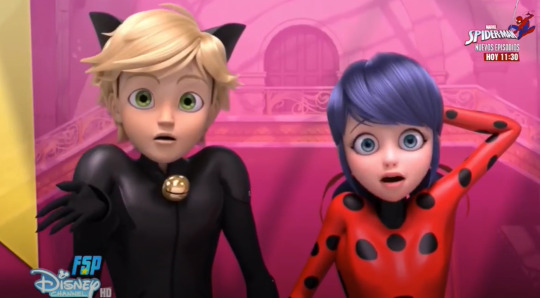
But, this trope has to make sense in-universe as a worldbuilding and narrative element.
Miraculous doesn't give us much direct information on how glamour works. And in this case, I think we need both SHOW and TELL. Because if you don't establish the glamour rules clearly, you are going to run into problems and create unfortunate implications with your storytelling choices.
Appearance
Miraculous obviously gives our heroes magical glamour. In "Lady WiFi" we find out that masks can't be taken off. It's magic. No other explanation is needed.
Miraculous can slightly change the appearance of users (eyes, face shape, height and hairstyles). People can identify and notice the hairstyles of heroes (numerous Ladybug wigs, statue in Copycat). Jagged Stone points out the change of hair when he mistakes Chloe for Ladybug ("Antibug"). But it's just a costume. There is no magic that prevents Jagged from understanding that Chloe isn't Ladybug. So, how does it work? But it's forgivable because it's cartoon logic. Suspension of disbelief works here, I suppose. I won't judge this too harshly.
Glamour also obviously prevents people from making a connection that Marinette and Ladybug have identical hairstyles. So people know that Ladybug wears her hair in pigtails, but magic does not allow them to notice similarities.
Another important question. Does glamour work on Kwamis? Can they see who is behind the mask?
New York Special makes it clear that magic does not affect robots and they can see through glamour. Does that mean that Markov, AI built by Max, knows the identities of Ladybug and Chat Noir? And it's never addressed.
Plagg in "Frightningale" says that holders can subconsciously choose their superhero appearance. This is actually pretty interesting and I like this idea a lot. Except the show is not consistent with this. The transformation of Master Fu looks identical to Nathalie's. And we have seen how different from each other Ladybug and Black Cat holders looked in the past. At the same time, Master Fu and Nino have different takes on Turtle superhero suit.
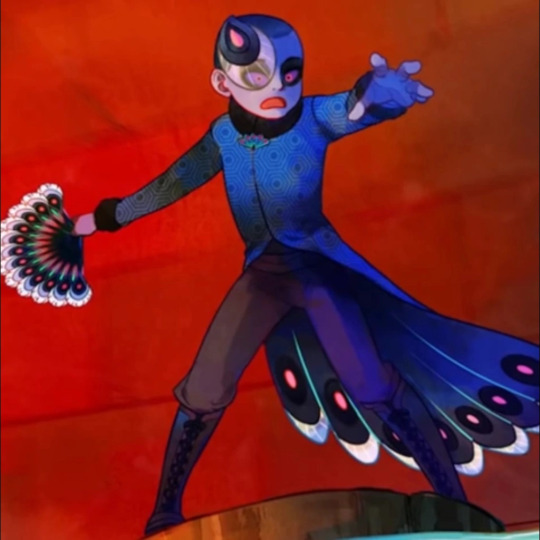

Age Glamour
Does age glamour exist? Do people see Ladybug, Chat Noir and other heroes as adults even when they look like teenagers to the audience (their height and build are smaller even when they are transformed)? Is that why no one ever questions the fact that children nearly die on a daily basis?
I mentioned unfortunate implications earlier. Well, this is where they come into play. Let's talk about "Copycat". A lot of people discussed it before me, so I won't bore you with details.

When I watched "Copycat" for the first time Theo's crush on Ladybug didn't bother me, because I thought that he sees Ladybug as his peer, a girl who is about 20-23 years old. Theo is an artist, his character design is that of an adult. He has his own studio, its appearance indicates that he did serious commissions in the past. The guy has no idea that Ladybug is like 13.
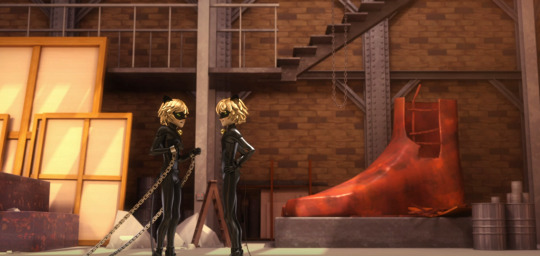
But then we get "Heroes' Day" and "Ladybug". And Hawkmoth calls them "kids", which means that there is no age glamour. Others see Ladybug and Chat Noir as teenagers. Perhaps, other Miraculous users aren't affected by age glamour. Therefore regular people see all heroes as adults but other heroes are able to guess their age more or less correctly. But you must spell this thing out because the audience can interpret "Copycat" differently. If there is no age glamour, then Theo is crushing on a teenage girl and he is fully aware of this fact. And this doesn't look good for your show.
The "No Age Glamour" theory is further confirmed in "Sapotis" where Alya just straight up analyses voice recordings and says that Ladybug is a girl their age. If glamour exists then it should also cover technology. Kwami can't be photographed. Face and voice recognition software shouldn't be able to analyse transformed superheroes and detect their identities in any way.
Besides, after "Sapotis" Alya should definitely be sure that Ladybug is not 5000 years old (also not an adult), especially after she wore Miraculous herself and was one door away from detransformed Ladybug.
SEASON 4 UPDATE! There's no age glamour after all.
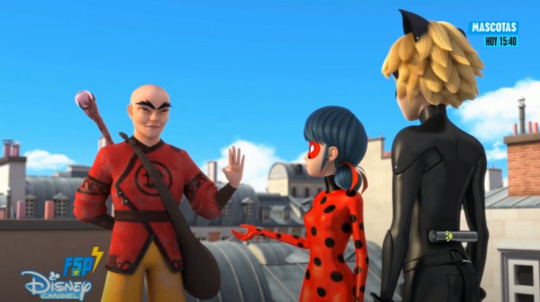
In "Furious Fu" Su Han calls Chat Noir a child without knowing his identity. It means that everyone knows their superheroes are teenagers. "Copycat" can't be saved from that, uh, subtext anymore. No one questions the danger of their job or the balance of their lives outside of the mask. No one doubts their competence after "Origins" ever again. No one becomes annoyed after being bossed around by two teenagers in spandex. You had many opportunities to drop these details into the narrative. Someone could have been akumatized over this (I will not be ordered around by some magical kids!).
I don't know why writers decided not to use at least this idea and slightly adjust "Copycat" if they got rid of the age glamour completely. It can be explained as kid's show logic, but unfortunately, I'm reluctant to do it. If many characters sympathise with akuma victims on-screen, why not with the teenage superheroes who must fight them?
New York Special had this weird focus on collateral damage out of nowhere (the damage done by sentimonster Robostus) and yet it has 0 effect on the main story. No one in Paris is pissed that their 2 teenage protectors weren't there.
Ironically, "Furious Fu" and that one remark made by Su Han also created unfortunate implications for other moments in the show. Just hear me out. Apparently, Jagged Stone wrote a "thank you" song for Ladybug knowing that she is 13-15 year old child back in "Pixelator". Fandom is more than happy to roast Lila for lying about saving Jagged Stone's cat and him writing her a "thank you" song. Fandom claims that Lila's tale could harm Jagged's reputation, when he wrote a song for teenage Ladybug several weeks prior. Meanwhile, in-universe this lie is 100% believable.
If we put on "realism glasses", then both this whole song situation and Theo's crush in "Copycat" have uncomfortable implications. However, the show's canon can't be viewed and criticised through "realism glasses". I admit that bits and pieces of my criticisms are affected by these "glasses", but, ultimately, I'm trying to be fair and concentrate only on things that can't be justified by "cartoon logic and worldbuilding".
Could the existence of age glamour solve this problem of unfortunate implications and other concerns mentioned above? YES. Is it better for the narrative? YES. Is essential for the story? NOT QUITE. Could the absence of age glamour be called an irredeemable storytelling flaw? NO.
Disclaimer: On a side note, only older audience can notice these implications. Children, the target audience, most likely won't understand this subtext simply because they don't have enough experience. So, perhaps, this criticism is unfair, because these moments only look weird to me as an adult. It's like an adult joke in a cartoon that you don't get until you reach a certain age.
There's nothing technically wrong with adult writing a "thank you" song for a teenager. It's just an expression of gratitude. However, unfortunately, we live in a world, where adults normally wouldn't write songs for teens to express gratitude only. In real life similar actions would imply pedophilia and would be actively scorned by the public. No one would risk their reputation like that even if their intentions were genuinely pure and sincere. But this show can't be viewed through "realism glasses", because it's a cartoon and in certain cases we as the audience must use suspension of disbelief and pretend that certain things are possible for plot to happen.
Su Han also wants to give Ladybug and Black Cat to adults. Why didn't Master Fu do this then? Writers don't give us any explanation. Throughout the show we never question this up until the moment it's revealed that adults don't have time-limited powers. Then comes "Furious Fu". Story suddenly becomes self-aware here. Because apparently nothing prevented Fu from giving the most powerful Miraculous to adults who won't have time limit and will be more effective against Hawkmoth (see part 3 for more details).
I have a very good example of Age Glamour done right. It works in the story. There is no confusion or unfortunate implications. There is like one plothole connected to the glamour (it's been years and I still can't forgive them for Cornelia and Caleb) but otherwise, it's a pretty solid example of both show and tell. Clearly, writers wanted to avoid uncomfortable implications which are present in "Copycat". I am talking about W.I.T.C.H. comic books and animated series.
If you are not familiar with it, I'll give you a brief explanation. The story follows 5 girls, the Guardians of Kandrakar who are chosen to protect their world and parallel ones from evil. They receive magical powers from the amulet known as the Heart of Kandrakar. Their powers are based on elements: fire, water, earth, air and energy. Our main characters are about 13-15 years old. In the animated series they are younger and they attend middle school, making them 12-14 years old. But the transformation makes them look 18-20. They look like young women to each other and to other people. At the same time, people can recognise them, their looks and voice don't change. Most people don't know that they are really teenagers when they are not transformed and these people don't know that magic can make them look older. That's why everyone treats Guardians like adults when they are transformed. Comics establish this fact in the very beginning. In first issues characters state that they look older, we are also shown this multiple times.

In fact, one of the first side plots revolves around the fact that Irma uses her powers to sneak into the disco club to meet up with her crush. Irma is 13 at the beginning of the series, she is a high school freshman. Her crush, Andrew Hornby is a senior guy 17-18 years old. Irma has liked him for a long time and wants to impress him, so she decides to be clever about this. She transforms into her Guardian form of the 18-year-old girl, hides her wings, sneaks out to the club after her parents are asleep without any problem, and meets Andrew, who obviously doesn't recognise Irma in this girl who looks about his age. Smitten Andrew offers her a ride and 13-year-old Irma doesn't understand the implication of that offer, so she accepts. And, obviously, he decides that she is interested in more than just a ride home, since she agreed, and the comic implies that he fully intended for them to have sex in the backseat of his car. But Irma understands the implication only when Andrew tries to kiss her. She panics and turns him into a frog. And she actually pulls this "I need to look mature" trick more than once over the course of the series.
It's not the only situation where this age difference is handled well and makes sense. People who know the main characters in everyday life remark on their older appearance during transformation. Sometimes people flirt with Guardians when they are transformed. In one of the side-novels centred around Cornelia, she is worried that the prince of the realm they helped to save from famine would try to marry her. That never happens, but Cornelia actually brainstorms with her friends about how to tell the prince that she is really 15.
There are many other plot points where this happens, but I think that you got the idea. I really like how "Age Glamour" was handled in W.I.T.C.H.
How do we fix this? Create the situations where people offhandedly mention "Age Glamour" in the presence of Marinette or Adrien, use Kwami for this.
"Don't worry, dear. Chat Noir and Ladybug are adults, who know what they are doing. I am sure that they will handle this. "
Theo could say: "Oh, I wonder which university Ladybug goes to?"
"So, does that mean that other people see us as grown-ups, Tikki?"
A few words and boom, problem solved. Then allow the "show don't tell" rule do the rest.
#miraculous ladybug#ml#miraculous analysis#miraculous meta#ml meta#ml analysis#miraculous transformations#miraculous critical#miraculous ladybug critical#miraculous glamour#superhero glamour#miraculoustalesofladybugandcatnoir
68 notes
·
View notes
Text
They can’t ALL be serial killers: keeping your villains funky fresh
Ah, villains. Spicy assholes. Tricky buggers.
Villains can be very intimidating to write: writing requires you to put yourself in the shoes of another person, which is one thing to do with a decent person. But when you are putting yourselves in the shoes of a bad one - whether it be someone who is simply not very likeable or someone who functions in an antagonistic capacity to a story or rp universe’s hero - well, it can be uncomfortable.
I didn’t start writing villains until well into my rp career, and I can’t think of a single character I wrote in my undergraduate creative writing degree who was an asshole. I now write a small handful of them - and like most things, I don’t think writing a villain is quite as scary as we sometimes build it up to be in our minds!
That said, writing a villain is an exercise in nuance, and this is something that is often missing from antagonistic characters. In this tutorial, we’ll talk about what makes a villain, and what makes a villain a well-rounded character.
Triggers, mentioned largely in passing as examples: criminal activity, murder, assault, child abuse, car accident, drunk driving, animal abuse
What makes a villain?
Generally, when we talk about villains, it’s in the context of a narrative, some sort of overall plot theme where there is Good and there is Evil. Think: Death Eaters, the Dark Side, the Horde, the Daleks, the Orcs, etc, etc etc. For the purposes of this tutorial, I’m talking about characters who serve in that antagonistic role, but everything can also be applied to characters who are just shitty people without a part to play in any larger scheme.
In a plot context, per Oxford Languages, a villain is “a character whose evil actions or motives are important to the plot.” To be important to the plot, you do have to post, and if that’s something you’re struggling with, you might want to check out my Writer’s Block TED Talk ;)
A villain can have any number of reasons for being Like That: perhaps they were raised with a particular worldview, or were targeted by a negative influence at an impressionable and vulnerable stage, or genuinely believe they are doing the right and good thing. Maybe they’re just an asshole. In-character, your character likely doesn’t identify as a villain (because everyone is the hero of their own story) and in-character, your character might have friends, allies, and others with varying knowledge of your character’s misdeeds.
However, out-of-character, you and other writers should recognize that your character is a shitty person. Writing one-dimensional, universally terrible assholes isn’t much fun, though. Which is where nuance comes in.
Give your character other traits than “evil.”
Unless your character is THE Big Bad - the Voldemort, the Sauron, the Hordak Prime - there is no reason for them to be Ultimate Evil, and writing them as an endless wash of evil will be boring for you to write and boring for other people to read. Your character should be something other than naughty.
Using my own handful of villains/bad guys as examples, since obviously I take my own advice, and with apologies that 99% of my rp writing is in the HP verse:
Claude is a Death Eater as well as second-in-command of the magical mafia. He’s an expert blackmailer, has no qualms with murder, and can get pretty gruesome about it if he’s pressed to make a point. He also doesn’t drink, is a devoted father (has framed finger paintings in his study! drinks the pink lemonade his daughters love in crystal rocks glasses!), uses weird slang (”beat it, bozo!”) and takes the family spaniel on daily walks through Kensington Gardens.
Cleo is a Death Eater and a lifelong bully, prone to theft, physical abuse, and with a knack for the Cruciatus Curse. She’s also deeply insecure, with an unshakeable need to be seen as useful; she’s competitive, and she’s horny enough to drop her purist pretense if a Muggle girl is what’s easiest to get her rocks off.
Sadie is a squib spying on Order-organized safehouses for the Death Eaters. She’s also intensely curious and ambitious, determined and self-directed, and if she doesn’t understand emotions, it certainly doesn’t stop her from understanding how to manipulate them to maintain the illusion that she is not a threat.
All three of these character concepts are more compelling than:
Veronica is rude, hates people, is outwardly mean to everyone she meets, uses cultural slurs on the regular.
We get it! Veronica is a shitty person! What else is she? In real life, shitty people typically do find camaraderie somewhere, somehow. Maybe Richie is a total asshole but has made a lot of money from his hedge fund, and he is generous enough with his yacht, ski condo, and jet that he has an entourage he thinks are genuinely his friends. Maybe Kaiytlynn is selfish and entitled, but her access to the entire royal family of Spain keeps her gainfully employed, and she’s genuinely good with her bedazzled bra business. Maybe Claudia is a giant racist, and she’s also YouTube’s most popular craft video creator.
In real life, maybe there are some shitty people who exhibit fully antisocial behaviors and are rewarded for it. But this is fiction writing, and moreover, it is collaborative fiction writing, and Veronica is not a character who is fun or enjoyable to plot with. Antagonistic plots can have more trouble finding their footing than strictly romantic ones - but they can be fun and rewarding, provided that the antagonist is a compelling one.
Let your character be something other than “evil.”
Give your character a cover.
More specifically than a trait other than “evil,” give your character a cover. By this I mean: give your character an angle that obscures their true colors, something that lures people - good people and bad people - into a sense of safety.
Give your character something that keeps other characters from taking one quick look at yours and immediately clocking them as a bad guy.
In real life, it often takes time to realize toxic people are toxic. In real life, people enjoy circumstances that make people less likely to view them as toxic - just look at the number of people who think Jeff Bezos’s obscene wealth is a marker of his merit as a human being.
If your character commits a murder a week, is actively abusive to everyone they meet, and has no relationships with any other characters who might vouch for them - idk, man, I think your character is going to get caught! If your character is a quiet and unobtrusive owner of a vintage boutique, however? Well, they certainly don’t scream “IT’S ME! I’M BAD TO THE MOTHERFUCKING BONE!”
In the case of my bad guys:
Claude is a doting husband and father, notably not ascribing to purist tendencies that discourage women from work outside the home. He does legitimate work in real estate and investments, in addition to his shady dealings, to have a legally-sound paper trail should he ever be investigated. His family money funds an entire wing at St. Mungo’s Hospital, and he contributes to political campaigns for centrist politicians. He presents as a harmless goofball. He killed a man well before he turned seventeen. He almost went to Azkaban before graduating from Hogwarts. (”Oh, but he’s on the straight and narrow now!”)
Claude’s cover is that he masquerades as a genuinely good person, and a nice person. When people think about his old-money Sacred 28 family and what that might mean for Claude’s political activity, they also think about how he is a Gryffindor - not known for churning out Death Eaters - and they think about how he doesn’t seem intense enough to be a Death Eater. They don’t suspect enough to have much to go on.
Cleo works as an Auror, and she’s genuinely good at her job - if only because she manipulates cases away from incriminating Death Eaters and their allies and occasionally Imperiuses a contact or two from her days as a Knockturn Alley bouncer to frame them for a crime. She doesn’t use slurs like “mudblood” at the office and doesn’t talk about blood status there, either. She doesn’t pretend to be nice, and her honesty there makes it easier to believe she’s not pretending when she does her job. It helps, too, that she is not Marked.
Cleo’s cover is that while she seems like an asshole and is an asshole, she works in the agency tasked with eliminating Dark wizards and she’s good at her job, as far as anyone can tell. She is an asshole, but there isn’t reason to suspect she is an asshole who is part of the Death Eaters, and it is not illegal to be a dick.
Sadie goes out of her way to be friendly to every new safehouse occupant, acting as a guide to newbies about how to live in the shadows. She performs the role of caretaker, therapist, and confidant, carefully doling out the reveal that she is a squib for sympathetic effect.
Sadie’s cover is that she manipulates other people into viewing her as too weak to be any kind of threat, and she intentionally manipulates people into relying on her for support and guidance.
If your character is not experiencing social repercussions for being an asshole, they need to have a cover. If they are being an outright asshole, this should negatively impact them somehow.
An outright asshole might be stuck in a dead-end job because no one wants to promote someone who’s not a team player. An outright asshole might be super lonely without the self-awareness to realize that their garbage personality is the reason for their romantic troubles. An outright asshole might not be able to talk their way out of a problem.
If your character is an outright asshole and experience no repercussions whatsoever, they’re probably a bit OP.
Give your character a motive.
Now the big question: why is your character Like That? Like, for real. It’s so easy not to be a dick. Why are they a dick? What’s in it for them?
Yes, some characters might be an asshole because they think it’s fun and they like to watch other people suffer. But if all your characters are like that - isn’t that kind of boring?
If all your characters are like that - are you actually writing distinct, well-developed characters, or are you just spitting out the same edgelord with different faces?
Some of your character’s reason for being a dick can be because they think it’s fun. It can’t be the entire reason. It especially can’t be the entire reason all the time.
Of course you can come up with a big tragic reason why a character is an asshole - but it truly doesn’t have to be that deep. (Tips on tragic backstories here.)
Of my baddies:
Claude is a purist because someone has to be a lesser class, and it’s sure as shit not going to be him! Claude is a Death Eater because his father saw a business opportunity - both direct work (e.g. the DE contracting Claude and his goons out for a hit, trafficking dark goods, doing deals with purist groups in other magical organized crime outfits across Europe) and indirect work (e.g. having stronger appeal to some of the most influential wizarding families.) He doesn’t love being branded with the Dark Mark (HE is the master of his fate, goddammit!) but hey, it’s a living.
This is a motive centered around financial gain and expediency. Claude is shitty to value money over human life, and he has no qualms about violence - but the motive is not “fun.”
Cleo is a Death Eater because, as a girl from a pureblood family of no importance, she recognizes that many of the people in the Death Eaters are important and influential, and she wants that kind of power. Additionally, she does get a kick out of violence, but she’s a weapon more than she is a fighter: she’s a tool who needs someone to wield her, to give instructions, to give her purpose. The Death Eaters offer both.
This is a motive centered around status and around order - Cleo being a person who needs order externally forced upon her.
Sadie is working for the Death Eaters because she believes they will win the First Wizarding War, and she wants to secure a place in their new order - ideally something more than she had previously as a squib. She figures if the good guys are really good they’ll forgive her for keeping herself alive - but that the bad guys won’t forgive disloyalty. Also, her boss in the Death Eaters indulges her research in the Dark Arts, which is fun.
This is a motive centered around security and self-satisfaction. It’s very selfish and cold, but it’s not, like, Sid from Toy Story.
Why is your character Like That? What do they get out of Being Bad? What do they like about it? What purpose does it serve for them?
If you can’t think of a reason your character would be a Bad Guy beyond that you want to write a Bad Guy, you should probably rework the character. It’s tricky to write someone who really should just be a Good Guy as a Bad Guy because, depending on your site’s setting, you might end up being a Bad Guy Apologist, leaning into the positive qualities of your character without writing them as an actual villain/antagonist/baddie - and remember, Death Eaters are shitty people! Antagonists antagonize! They should be complex, but you should never lose sight of an abusive class being abusive!
And finally,
They can’t all be serial killers.
It’s tempting, since we’re writing fiction here and we all love drama, to reach straight for a Big Evil when we’re writing a baddie. They murdered ___! Egads!
If all of your baddies murdered their spouse/parent/sibling, again I ask you: are you actually writing distinct, well-developed characters, or are you just spitting out the same edgelord with different faces?
(If all your baddies specifically murdered a woman, might I ask you to examine this choice? Misogynistic violence is not a shortcut to character development.)
Cast of characters aside - what is it your character does that makes them evil? It is worth noting that bad behavior exists on a spectrum, and to jump to the far end of that spectrum without building the character up to it is often jarring and confusing. There are many, many things your character can do that might contribute to their Bad IdentityTM without killing anyone!
Baby Bads: No one gets hurt in a serious way, but the character is unpleasant. Think: a schoolteacher might not let you go to recess. You might get detention. Examples:
petty theft
general assholery
bullying
lying, small & large scale
general unkindness
minor manipulation for personal gain
Middling Misdeeds: These might cause some harm - physically, emotionally, or otherwise - but there’s some room for smart-talking or otherwise evading major consequences. Think: suspension. Examples:
larger theft and other money-related naughties: money laundering, ponzi schemes, etc
physical assault/battery
blackmail
bribery
large-scale manipulation for personal gain or for fun
hate speech (to be clear, I, JB, think this is way more than middling, but in art as in life, a lot of characters are going to do it and get away with it.)
Terrible Transgressions: The far end of the spectrum of antagonistic behavior. If your character is doing this shit, it shouldn’t be coming out of the blue. If your character is doing this shit, there’s got to be a character-driven reason beyond “flavor.” These are things that would get you expelled and moved into criminal court. A lot of things that are viewed as standard topics requiring a trigger warning fit into this category.
murder
sexual assault
torture
child abuse
It’s easy in rp, where there are often way more criminal types in a character population than we hope exist IRL, to forget that murder is.... like.... it’s a BIG DEAL. It’s not something everyone has done. And thank dog, right?
If you’re attached to your character being someone’s cause of death, for specific character-driven reasons, you might think about alternatives. For example, if you hope to convey that Brandon Baddie is a callous asshole, instead of having him kill his roommate over a household chores dispute, you might have him drive drunk, hit a pedestrian, get out of the car, see the body, and drive away. If you hope to convey that Sandy Sadist is cruel, you might have her threaten her sister’s dog, but not actually hurt it, enjoying the fear of the sister and of the dog more than she would enjoy actually hurting either. If you hope to communicate that Ruthie Reckless is thoughtless, you might have her driving 100 mph speeding to the edge of a cliff while her father sobs in the passenger seat, stopping just inches from the edge.
There are so many ways to make a point. If you’re going to kill someone to make a point, do it sparingly, and with very deliberate purpose.
Whether you’re starting your first villain or hoping to hone your villainous sword, I hope you found this tut helpful! Best of luck, and happy writing!
59 notes
·
View notes
Text
Unpopular Opinion Time
I’m going to say something that I know some folk are going to disagree on... but I honestly feel that Max Caulfield is a closeted lesbian instead of being bisexual. And I think there is sufficient information in the game and with Max’s journals to verify this viewpoint.

First, it’s important to explain something: you can be lesbian and still have had sex with men. There are lesbians who were married to men for years before finally accepting the truth about themselves... just as there are gay men who were suppressing the truth about themselves and then after a decade or more and having had kids, divorcing their wives because they were gay all along. You can be lesbian and not know it... all you know is that something is wrong. You know that you should be happy with a guy and can even have the most decent boyfriend or husband in the world... and yet it doesn’t work because you are not wired that way. It happens.
These women (and men) were raised to believe they were straight. They were raised to believe they should be dating someone of the opposite gender. They can end up having families and yet have that niggling sense of something being wrong in the back of their heads. This is because of a concept called heteronormativity or the view that heterosexuality is the default sexual orientation. You can be raised believing you’re straight (or cisgender for that matter) and never quite understand why things feel off.
Now let’s look at Max Caulfield. Folk like to claim she’s bisexual because of the pseudo-romance angle with Warren Graham and with Max’s claims of being attracted to “skater dudes” but that the attraction isn’t mutual. Yet when you see Max interacting with the skaters of Blackwell, she knows pretty much nothing about them and outside of the whole “I’m into them” never seems to show any actual attraction toward them. It’s a line that falls flat. It’s like the writers decided to check the box “likes guys who ride on skateboards” and never went anywhere with it... or at least it might seem that way until you find out that Chloe Price was into skateboarding... Max’s best friend who she is increasingly crushing on as the game continues. It’s reasonable to ask how much of Max’s attraction to “skater dudes” is because she is into Chloe skating but doesn’t realize for a while that she could be into Chloe.

Max’s relationship with Warren is more complicated. There has been claims that Warren’s romance angle (which never was that strong a path in the game, especially when compared to that of Chloe) was added in because of a strong positive fan reaction to Warren. Even then, there are enough actions that Warren takes that honestly are disturbing that honestly, Warren is not a good match for Max. The boy photoshops a picture of Max with him and keeps it in his gym locker - a place that Max is unlikely to ever see it, but also a place where other guys will see it and thus give Warren “bragging rights” about Max. He also has a date lined up with Brooke but asks out Max and then if the player has Max accept Warren’s date invite will call Brooke while Max is still around and cancel the date with Brooke and state he’s going with Max instead. He even instigates fights with Nathan Prescott, likely in an attempt to “show off” to Max and to be her “knight in shining armor.”
A much larger factor as to why I just don’t get a sense of Max being into Warren is her journal. I half-suspect some fans don’t bother reading it which is a shame as it gives a lot of important details about Max and her thoughts and views. Most important to this is her early comments about Warren in which outside of considering him “dark and witty” she shows no attraction to him. In fact, on the first day of the game, her journal has this specifically to say:
We talked about Warren and Dana implied he likes me. Ew.
Damning words. Seriously, she went “ew” over a “dark and witty” guy “liking” her. Another torpedo in the water has this comment in Max’s journal if she accepted the date with Warren:
Hope he doesn't make a lame move on me... (Not that he would, egomaniac.) Warren and I do have a lot in common, but he's like a supercool geek brother...
First, she doesn’t think Warren is into her. In fact, even entertaining that thought has Max calling herself an egomaniac. But what’s especially damning is the fact she considers Warren a “supercool geek brother.” I’m sorry, but Max went beyond Friendzoning Warren. She brotherzoned him.
The closest her journal has to suggesting Max is at all attracted to Warren is her journal entry if you didn’t kiss Chloe and do kiss Warren:
Considering how insane my life has been this week, kissing Warren in the middle of a deadly storm didn't seem to be that strange. It felt like we were flipping off the cruel universe... and if I was going to die, I wanted one kiss from a boy I cared about.

Honestly it’s not much different if you also have Max kiss Chloe (though the line changes to “I wanted one kiss from two people I truly cared about”), and honestly if she thinks about Warren as a brother then obviously she’d still care for him. So the whole bit of Max being into Warren really starts to fall apart when you take a long look at the facts and Max’s journal.
Another interesting bit can be found in Max’s journal if the player has Max not kiss Chloe... and it’s this line:
I would have, but I didn't like being dared like it was some big deal. Maybe I am scared. Of what? I think I'm too young for marriage.
Later, again if Max hadn’t kissed Chloe, when she returns from her first timeline alteration trip she writes this in her journal:
I've never been so glad to see Chloe in my life. The second I saw her blue hair and that beautiful pissed off face, I kind of regretted not kissing her when she double dared me. Maybe if she had double dog dared me...
And Max’s final entry in the “didn’t kiss Chloe” setting is thus:
Maybe that's why I hated watching Chloe being so cruel in the nightmare, calling me names and trying to hurt me... I was surprised that it was like a physical pain in my heart. Is that the power of love... or friendship?
Is that the power of love... or friendship? Max asks that in both settings, in which she kissed Chloe and where she didn’t. It’s much more obvious when Max is busy kissing Chloe on that third day (and seriously, Dontnod should have included an option for Max to say “then don’t back away this time!” if you have Max Rewind for another kiss three or more times).
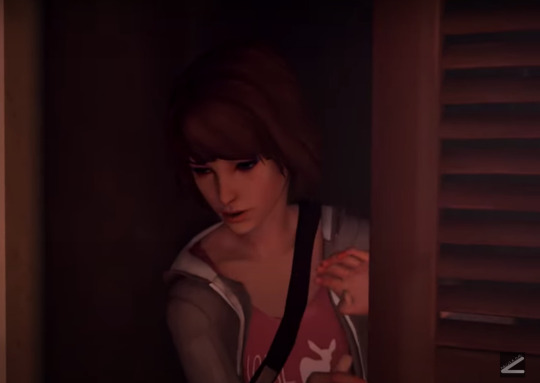
The argument for Max being into guys is at its heart as flimsy as that of Chloe being into guys because she has condoms in her wallet. Yet the condoms can be explained away as used to keep sex toys sanitary (yes, women can get STDs from other women if they’re not careful!), and Max’s “interest” in guys can easily be seen as “expected” of her. Given that Max can literally step out of Chloe’s closet to protect Chloe... Life is Strange can easily be seen as Max’s coming to terms with her own lesbianism and stepping away from an easy and expected life to embrace the unknown with the woman she loves by her side.
#life is strange#my posts#max is not into guys#yeah she's a lesbian#max caulfield#chloe price#max and chloe#pricefield#she's not bi#heteronormativity#warren graham
495 notes
·
View notes
Note
Hello! I just found your yt channel (it's amazing) and watched your video on writing diversely. What an awesome video, I learnt and took away a lot from you and your thoughts, especially as a white writer. I am still however a little conflicted on one thing. Not just writing the characters as another race or gender or identity of any kind from the writer, but the actual main character. Would it automatically be offensive and destined for failure for a white author to write a black main protag?
Hi there! I’m happy you found the video helpful, thank you for watching! This is a link to the video if anyone reading this has not watched it.
To be honest, I think I explained this as concisely and accurately as I could in the video as it’s truly the thesis of the video itself. I don’t want to fully reiterate what I said in the video because I feel like I won’t be as accurate/coherent, so I urge you to rewatch the video and take care to look at the timestamps as that may clarify your particular question, first and foremost! Taking a look at some of the comments too might also be helpful.
Stay in your lane as a detrimental, albeit well-intentioned, mantra
As I say in the video, it’s not as easy as saying “white people can’t write XYZ main character” or “we can write whatever we want”, nor is it as easy as and saying “stay in your line” , which may inadvertently enforce the majority as publishing is majorly white (stats are in the video). I believe I did address main characters too in that video, but whatever I said about characters in general 100% applies to POV/main characters as I was rebutting the well-intentioned, but perhaps detrimental idea that it’s only appropriate for a marginalized POV character to be written by someone marginalized in the same way (IMO, long-term, this will cause an influx of white POV stories which is the opposite of the intention [people say “stay in your lane” will allow marginalized folks to represent themselves rather than have white people represent us] as the publishing industry a) is mostly white and b) only seems to care to actively publish white people. “Stay in your lane” may also inadvertently define the role a marginalized person should play in the writing industry [responsible for writing stories about their marginalization]).
Writing POC main characters = automatically offensive/destined to fail?
If you’re viewing or questioning if writing a POC MC is “automatically offensive” or “destined for failure” I really urge you to rewatch the video because this is covered quite extensively but particularly take a look at the “trade fear for empathy” section as this question in itself is laden in a black and white binary of right versus wrong. If you’re asking this question, it might be that you are lacking the empathy to understand what I’m saying in the video (which is okay! there are many others who I’ve further discussed with in the comments). Writing POC isn’t something that’s destined to fail just because you’re a white author IF you do your research, be respectful, write empathetically and craft well-rounded, complex people. If you’re thinking you might automatically fail in this department because you are a white person, I did mention in the video that you may not be ready to write diverse characters in the respectful, robust ways necessary because you may be viewing POC as a “pass or fail” system which is obviously not what we are. If you want to write a diverse POV character and you do your research, write empathetically, speak to those people from that community (with their consent) and be willing to adjust your representation with that feedback without getting defensive, I don’t see how this would be automatically offensive or destined for failure, just like anything else that requires research.
Disproportionate amounts of white versus POC writers being published
In terms of publication failure, white people are actually the ones being majorly represented to write marginalized stories (when they don’t share that marginalization), so you probably wouldn’t have a problem getting a POC-lead story published (not saying I think this is right) because publishers treat diversity as a quota/marketing tactic and IMO, don’t seem to actually care about representation on a structural level, but rather on a topical, superficial level (which is why my main point in that video is that publishers, not individual writers, need to be held accountable).
White writers accidentally “dehumanize” POC in a misguided attempt at being empathetic
I think some white people, (and I don’t exactly want to use this word because it is quite severe but illustrates what I mean) may accidentally “dehumanize” people of colour in worrying that whatever move they’re going to make is automatically going to offend us, when in reality, if you take the time, and put in the effort to research and get to know people of colour (from my comments, these worries often stem from white people who don’t know many people of colour IRL), you will see that yes, we are different from you and difference is good, but no, this difference does not make us an untouchable, unknowable species. I don’t mean to make this seem like an “I don’t see colour” or “the only race is the human race” argument, which would be harmful, but rather a reminder that people of colour are also human beings and as you would write a white character with empathy, integrity, and vigour, you should also do the same when writing characters of colour (I address this in more detail in the video).
Doing personal research in times of confusion
I understand that as a white person, thinking about and understanding these issues may not be particularly easy, and even after a nearly hour long video of me expressing these thoughts, I genuinely do understand why someone who is not affected by these issues daily may still struggle with grasping these concepts. That’s because anti-racism is not something you can accomplish by watching one video, or reading a few articles--it’s a lifelong commitment, and so that’s when you would take your privilege as a white person to do more digging before you ask questions to those who have to expel emotional labour to answer them for you (not saying I have any problem answering your question at all, but putting this out there because there are many well meaning white people who I’ve encountered in my comments that do ask me or other BIPOC questions before turning to other resources that wouldn’t require free labour). Take some time to ruminate with this info, and then do some digging of your own. If you haven’t checked out these, these are my favourite anti-racism resources, all of which are free to access (noted otherwise):
Jane Coaston - The Intersectionality wars
A pretty comprehensive place to start with Kimberle Crenshaw’s theory of Intersectionality
Peggy McIntosh - White Privilege: Unpacking the Invisible Knapsack
Wonderful place to start in understanding white privilege for those who don’t understand the differences/nuances between race VS class VS gender privilege etc
Article that explores white privilege beyond McIntosh’s ideas
It’s really important that white people also learn the systemic ways in which they benefit from white privilege and not just the “bandaids are made in my skintone” examples (though those examples are often used first because they’re the easiest to understand for a white person who is affected by other intersections, i.e. class, sexuality, gender, who does not feel they are privileged in other ways i.e. race).
Documentary on white privilege (Jane Elliott’s Brown Eyes VS Blue Eyes experiment)
Angela Davis - How Does Change Happen?
bell hooks - Ending Domination: The Struggle Continues
Abena Busia - In Search of Chains Without Iron: On Sisterhood, History, and the Politics of Location
I was able to access this reading through my university but IMO it is a must-read, especially for non-POC who may not fully understand the privilege of whiteness.
Claire Heuchan - Your Silence Will Not Protect You: Racism in the Feminist Movement
**Absolute must-read: “The theory did not emerge in order to aid white women in their search for cookies – it was developed predominantly by Black feminists with a view to giving women of colour voice (Heuchan).”
Tamela J. Gordon - Why I’m giving up on intersectional feminism
Powerful perspective on Intersectionality and how it’s been used in white feminism
Jennifer L. Pozner - How to Talk About Racism, Sexism and Bigotry With Your Friends and Family
Really good place to start if you have loved ones in need of education.
Maria Lugones - Playfulness, “World”-Travelling, and Loving Perception
This is the absolute crux of my points in writing empathetically.
"The paper describes the experience of 'outsiders' to the mainstream of, for example, White/Anglo organization of life in the U.S. and stresses a particular feature of the outsider's existence: the outsider has necessarily acquired flexibility in shifting from the mainstream construction of life where she is constructed as an outsider to other constructions of life where she is more or less 'at home.' This flexibility is necessary for the outsider but it can also be willfully exercised by the outsider or by those who are at ease in the mainstream. I recommend this willful exercise which I call "world"-travelling and I also recommend that the willful exercise be animated by an attitude that I describe as playful" (Lugones 3).
^^^ For writers struggling with the prospect of diversity and trying to find a place to start in what I call in my video "letting go of fear and voraciously welcoming empathy" I highly recommend this article as it is a powerful account of travelling across each other's "worlds". Read it for free with a free JStor account or through your institution, like your public library.
How to BLACK: An Analysis of Black Cartoon Characters
A FANTASTIC video that is an absolute must-watch (covers writing empathetically, writing with care)
If you have not already, read through the sources I used to formulate and argue my thesis in my video (much more detailed than I could do in an hour!):
Corinne Duyvis (ownvoices creator) on # ownvoices
CCBC - "Publishing Statistics on Children's/YA Books about People of Color and First/Native Nations and by People of Color and First/Native Nations Authors and Illustrators"
Hannah Heath - "5 Problems Within the Own Voices Campaign (And How to Fix Them)"
Saadia Faruqi - "The Struggle Between Diversity and Own Voices"
Kat Rosenfield (Refinery29) - "What is # ownvoices doing to our books?"
Lee and Low - "Diversity Baseline Survey 2019 Results"
Vulture - "Who Gave You the Right To Tell That Story"
School Library Journal - "An Updated Look at Diversity in Children's Books"
TL;DR: if you’re more overcome with the fear of offending people (often grounded in white fragility) instead of making the active, albeit sometimes uncomfortable, decision to do the hard work necessary to empathetically represent someone outside of your marginalization in fiction, I don’t think you’re ready to write POC in the nuanced, complex, empathetic ways necessary for good representation, and I would encourage you do more independent anti-racist work. (Note that “you” is not individualistically aimed at the asker!!)
Questions like this don’t necessarily have a clear-cut answer, and that is essentially the point of my video (I know, not super helpful, but I hope that makes sense!).
Hope this helps!
--Rachel
164 notes
·
View notes
Text
new 52 scarebat ship meme
(I had @heroes-etc give me more questions, but for scarebat this time, since we talk about it 24/7 but I never post about it. These are from this ship meme.)
4. Their favorite physical feature on each other?
There’s only one feature of Bruce’s appearance that’s scarier when he’s not wearing the batsuit, and that’s his creepy blue eyes. Especially the way Greg Capullo draws them where they’re sickly pale and have ridiculously constricted pupils.
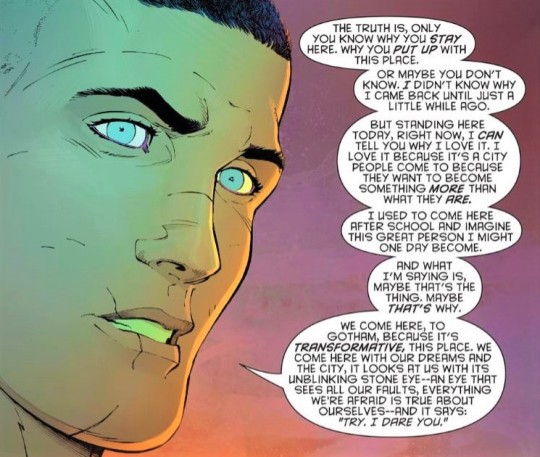
So his eyes would definitely be in the running for Jonathan’s favorite feature, even if seeing them would require Bruce’s mask to be off, which is something New 52 Scarecrow explicitly avoids. Yes, that character trait only exists to justify why Batman’s identity is still secret after Scarecrow mind controls and subsequently institutionalizes him in “Gothtopia,” but I think it’s interesting so I’m going to pretend it’s not shoe-horned in there for meta reasons.
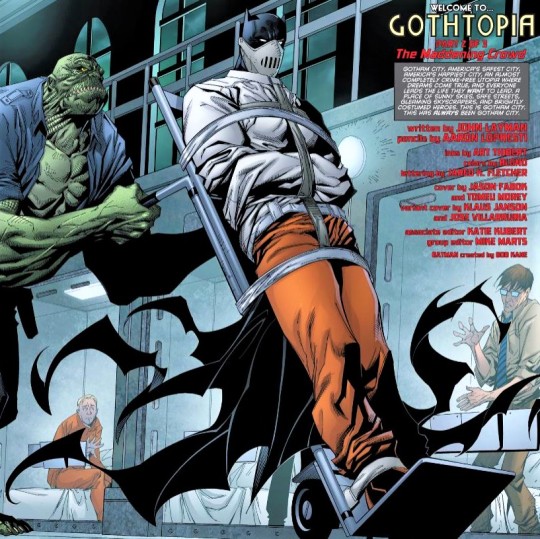
Actually having to see Bruce without the cowl on would definitely permanently break the illusion of Batman as a nightmarish inhuman bat demon, which I’m sure is a large part of the appeal for anyone as obsessed with fear as Jonathan Crane. But Bruce’s creepy eyes would be a serious consolation prize.
Bruce’s favorite of Jonathan’s physical features is rough, because Jonathan is famously not great re: physical features. I’m going to say his mouth, because a) that’s where the snark comes from, and b) the New 52 establishes that in one of their earlier encounters, Jonathan had sewn his own mouth shut, so it’s one of those things where a bad first impression turned positive later on leads to more fondness than if you’d made a good impression in the first place.

I just looked up the panel where he does it and I DID forget how incredibly gross his lips look here, which makes the fact that I have chosen it as Bruce’s feature seem really funny in retrospect. But I do think that seeing Jonathan’s mouth healed and unmutilated would be a reassuring reminder of how he’s stabilized since their first encounter, at least to the point that he isn’t hurting himself anymore. Also, Bruce buys him a lot of chapstick.
Bonus alternate answer that did not make it into the Google Doc:
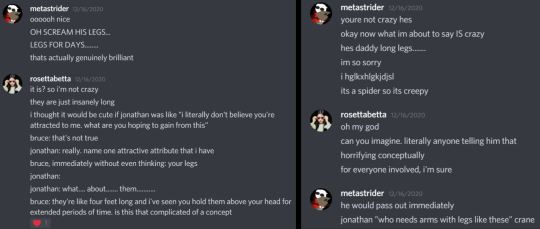
9. How open are they with their feelings?
Bruce and Jonathan are both pretty competent deceivers in the New 52; Bruce always, Jonathan depending on how the writer is feeling (though you could argue that Bruce just has a stronger grip on reality, while Jonathan’s skill at obfuscation varies with how lucid he is).
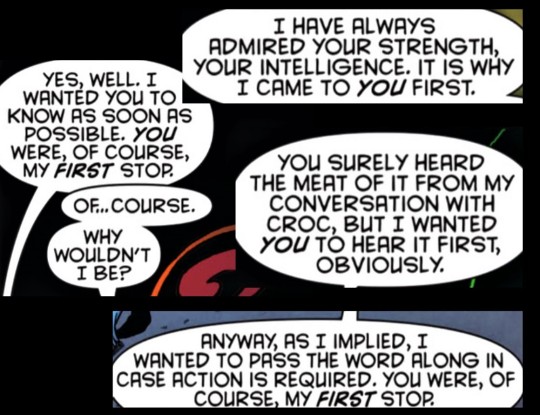
...I was going to use Detective Comics #23.3 as an example of Jonathan being a good liar, but actually upon re-reading I’m realizing that only 1/4 rogues buy his attempt at manipulation. So maybe he’s considerably worse at hiding his intentions than he thinks he is. Regardless, he doesn’t ever attempt to disguise his obsession with Batman.
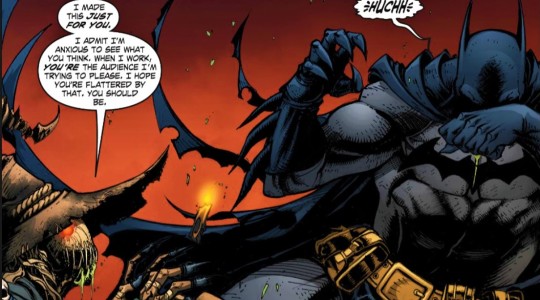
Whether or not he’d express romantic feelings or try to hide them is debatable. There’s no Masters of Fear equivalent in the New 52 establishing that he was ever mocked or punished for expressing romantic feelings for someone, though there is a flashback panel in his origin emphasizing that he was always lonely in this regard (and coincidentally doesn’t specify that his interest is in women, which is fun).
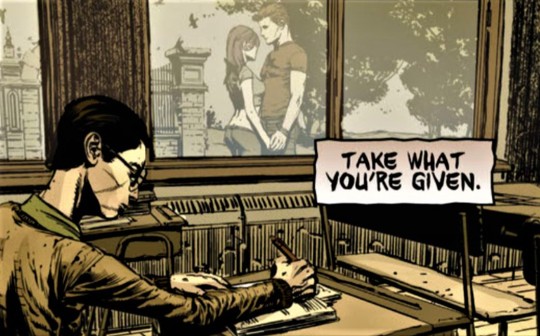
In Green Lanterns #17 he has some internal monologue about how fear is his romance and he needs Batman to feel it, but it is an INTERNAL monologue, so it’s not clear if this is something he would express to Bruce or keep to himself. Or if he’s even fully processed it himself, given how incredibly out of it he is in this comic. Most of his spoken lines are just kind of screaming incoherently. Bruce gets pretty snippy with a Green Lantern at the end of the issue for suggesting that Jonathan should be punished for his crimes as if he were in control of his actions.

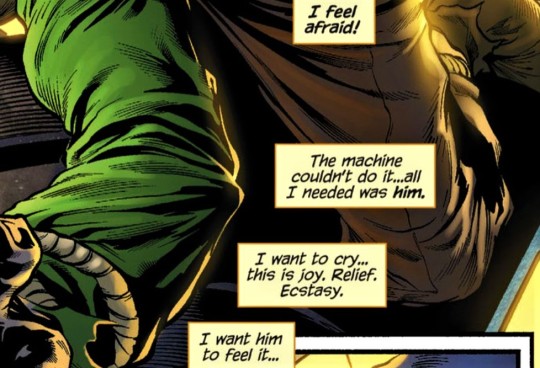
Bruce is a similarly complicated answer, since for all his deceptions and shadowy mystery he pretty much wears his heart on his sleeve when it comes to romance. It’s just that his heart doesn’t express or process emotions the same way as anyone around him, which can create conflict. His (seriously underrated) love interest during Scarecrow’s origin arc, Natalya, spent most of her time dating him thinking that he didn’t care about her for this reason. He was trying to express that he loved her, but he mostly did so through complimenting her skills, which she never took as serious declarations of affection because he wasn’t being straightforward and she was insecure.
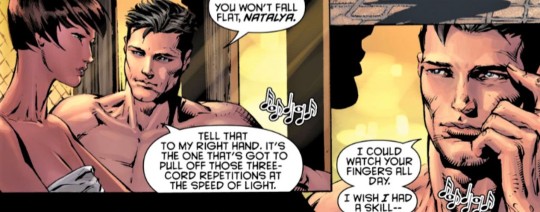
Jonathan does not himself seem like someone who would be especially secure in the idea of another person having romantic feelings towards him, so I assume that while Bruce might THINK he’s being open with any romantic feelings he develops, he would in reality just be really confusing.
13. How do they react to being away from each other?
I actually think that in general, Jonathan is one of the few people who would have no issue dealing with Bruce’s tendency to unexpectedly go AWOL for long periods of time, given that he himself has a tendency to fixate on his work to the exclusion of everything else.

But New 52 Jonathan specifically probably has pretty serious abandonment issues due to his father putting him in “the pit” and dying before he could take him out, meaning that Jonathan was waiting for his dad to come back for him for God knows how long, until Jonathan Sr.’s employers finally sent the police to investigate.

So while in general I think he wouldn’t be very clingy, any impression that Bruce had died or otherwise wasn’t coming back for him would probably be incredibly triggering. If Bruce could assuage this reaction by occasionally sending updates that at least indicated he was still alive, then I doubt Jonathan would have any problems with his absence.
(@heroes-etc: bruce sending like a checkmark emoji once a day. jonathan hears his phone ping, looks at the screen, and goes hm. good. and doesnt respond.)
Bruce meanwhile has no problem ditching literally any love interest at any time if something crime-related comes up, unless he’s considering quitting the cowl for them (as Joker probably accurately fears will happen with Catwoman in Prelude to the Wedding). But I don’t think he’d stop being Batman for Scarecrow, nor would Jonathan ever want him to — he’s interested in Batman, not necessarily Bruce Wayne.
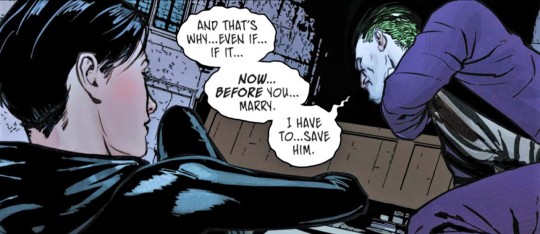
But even though Bruce wouldn’t have an emotional problem with distance, I think he would get similarly paranoid if they went too long without contact, though for different reasons than Jonathan. Unlike some other villains (*cough* Joker and Riddler), Scarecrow has machinations that don’t require getting Batman’s attention, so if he decided to continue with his less legal experiments, he would not feel compelled to get Bruce involved. While the “World’s Greatest Detective” would probably not have an issue keeping an eye on Jonathan while he’s in Gotham, he’s considerably less capable of that in space. And Jonathan is definitely a rogue he would be obsessed with keeping an eye on, even if he reformed.
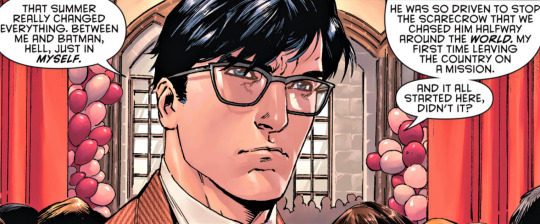
Batman & Robin Eternal established that Dick’s first supervillain conflict AND first mission leaving the country was chasing Scarecrow across the world for an entire summer, which is kind of insane considering how early it was in Batman’s career. Like, he did not have an army of children to watch Gotham for him while he was gone. He had one child, and he took that child WITH him. He left Gotham undefended for months, JUST to catch Scarecrow. Sooo that in of itself implies he wouldn’t be great at keeping his distance.
15. Does their view of themselves differ from their partner’s view?
Well, Jonathan occasionally sees Bruce as a giant bat demon, so yes.
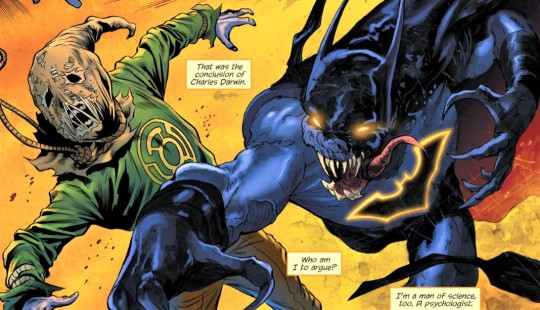
Outside of that very obvious differing view, Jonathan in general sees himself and the rest of the rogue gallery as more vital to Batman’s identity than Bruce considers them; the extent to which he’s right varies depending on your interpretation of Bruce’s character, but it’s definitely not something Bruce would ever consciously think or say.
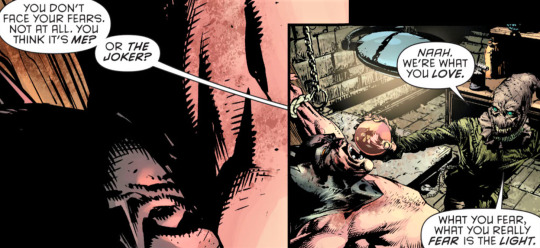
This is related to something that’s definitely a misconception of his, though, which is that the majority of Batman’s job revolves around supervillains like him. In Kings of Fear, when Jonathan blackmails Bruce into letting him come on patrol with him (which is a whole thing in of itself), he’s shocked at how boring most of Batman’s work is. Which probably goes along hand in hand with sometimes seeing Bruce as an almost mythologically inhuman figure.
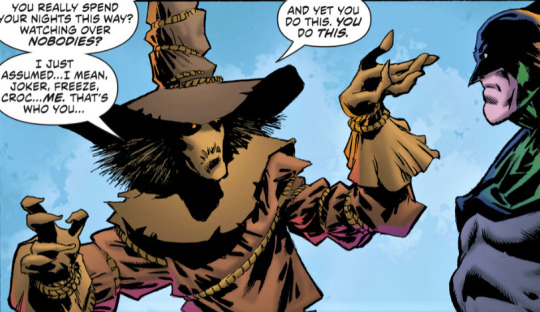
In his defense, it’s not like he has a lot of context for what the minutiae of Batman’s job is like. He’s either fighting Batman, hiding from Batman, or imprisoned by Batman in Arkham, a place where everyone else also spends all their time fighting or hiding from Batman. Which would really skew your perspective.
Interestingly, Bruce and Jonathan are both people who pride themselves on being extremely self-aware. Both of them probably inaccurately. You can rant about how you have a perfect understanding of your troubled mental state all day long, but if you’re still dressing up like a monster at night to indulge the power fantasies you created as a traumatized child by scaring the hell out of people, there’s probably a level of self-realization you haven’t gotten to yet.
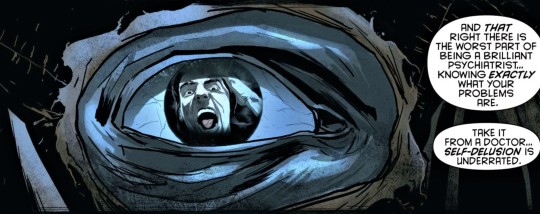
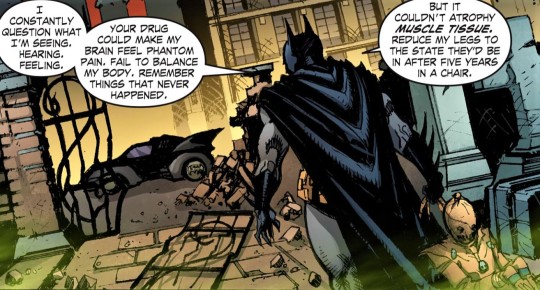
Bruce however is at least self-aware enough to regularly be able to analyze his way out of fear toxin induced hallucinations, which Jonathan is unable to do — when he’s not depicted as having become immune to his fear toxin due to overexposure (as he is in Green Lanterns #17), he can be defeated with the same formulas that Batman regularly manages to resist (like his honestly embarrassing breakdown in Nightwing #50).
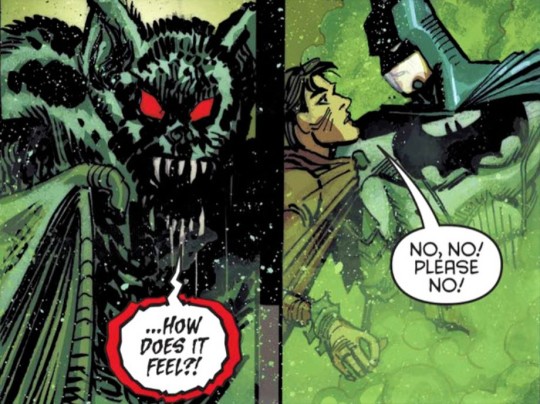
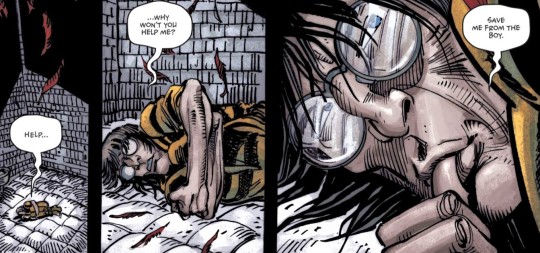
Which ties into the difference between how he sees himself and how Bruce sees him: Jonathan obviously visualizes himself as a “master” of fear. He actually has the same internal monologue about fear and trauma that Bruce does in Batman: The Dark Knight #13: “Make it your own... run to what you fear... stare it in the eye... until it whimpers and backs down.” But Bruce doesn’t see Scarecrow as conquering his fear; he sees him as addicted to it, to the point of his own detriment.
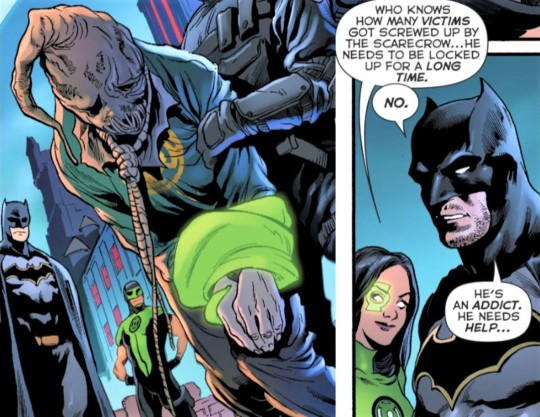
Which is interesting, because Jonathan clearly sees his Scarecrow persona as a way to regain control after being victimized by his father’s fear experiments throughout his childhood. I guess Bruce’s perspective would be that Jonathan’s father instead got him addicted to fear as a child, so his attempts at agency as Scarecrow are just a) reliving his trauma over and over and b) compulsively inflicting his own trauma on others. There’s probably some truth to that, even if overall it’s probably an oversimplification (and coincidentally pretty much EXACTLY what Riddler argues Bruce is doing by “funding” Batman in Batman Annual #4, so there’s that).
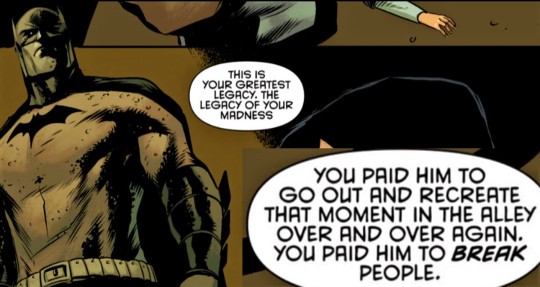
20. Did either person change at all, to be with their partner?
The obvious answer here is yes, because Jonathan is a supervillain with no regard for human life while Bruce is a superhero who has dedicated his life to protecting people. So presumably one or both of them would have to make serious compromises to be together. HOWEVER. Scarecrow’s primary motivation is to research, understand and inflict fear, while Batman’s modus operandi is making his enemies afraid of him. So despite their contradiction in morals, they’re uniquely positioned to advance each other’s goals, were they to ever join forces.
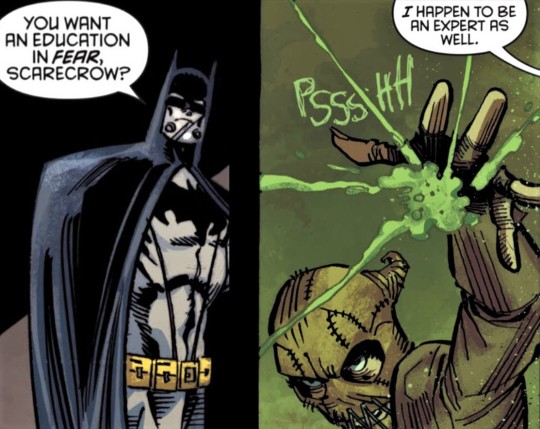
Bruce never has a problem using fear toxin on Scarecrow, presumably partially out of an “eye for an eye” sense of poetic justice, but also because Batman is practical and it’s a nonlethal weapon that’s always available to him while fighting Scarecrow. If he could have fear toxin customized for his own use, it’s hard to imagine him being unwilling to use it. In Gothtopia he actually advocates for using what’s leftover from Crane’s new formula on all the inmates at Arkham, which seems about as insanely morally ambiguous as it gets. Arguably, putting fear toxin in his smoke bombs would be considerably less wrong than drugging mental patients out of their mind when they’re supposed to be receiving therapy (this is also the issue where he illegally releases Poison Ivy because she did him a favor, which is both morally questionable and relevant to the current topic).
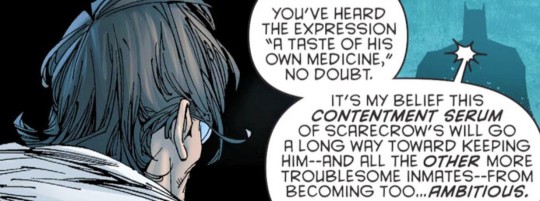
Jonathan obviously already thinks Batman is the most interesting possible case study in fear; it’s why he keeps coming back to Bruce and Gotham despite being one of the more independent villains in Batman’s rogue gallery in the New 52. So though he would have to give up actively kidnapping people (which would be a huge sacrifice, I’m sure), teaming up with Bruce would give him unrestricted access to his favorite test subject. Unfortunately, it seems very possible that he would fall back to old tricks if he ever felt that he’d gotten everything he could out of a partnership with Bruce. Fortunately, that would probably take a VERY long time.
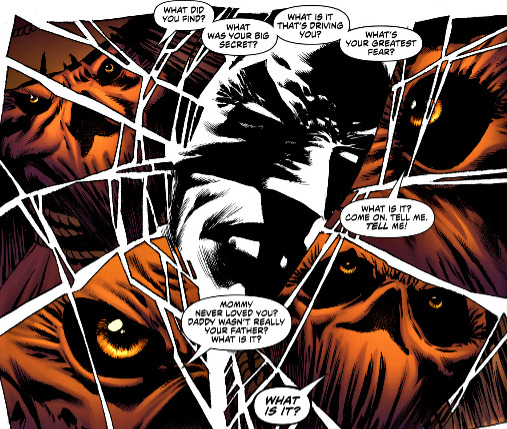
#scarebat#jonathan crane#scarecrow#bruce wayne#batman#ship meme#every day i think about the parallels between bruce and jonathan's childhoods that were set up by their new 52 origins#well. not every day#pretty goddamn regularly#i used to absolutely despise the new 52 scarecrow origin + characterization#but scarebat redeemed it for me
51 notes
·
View notes
Text
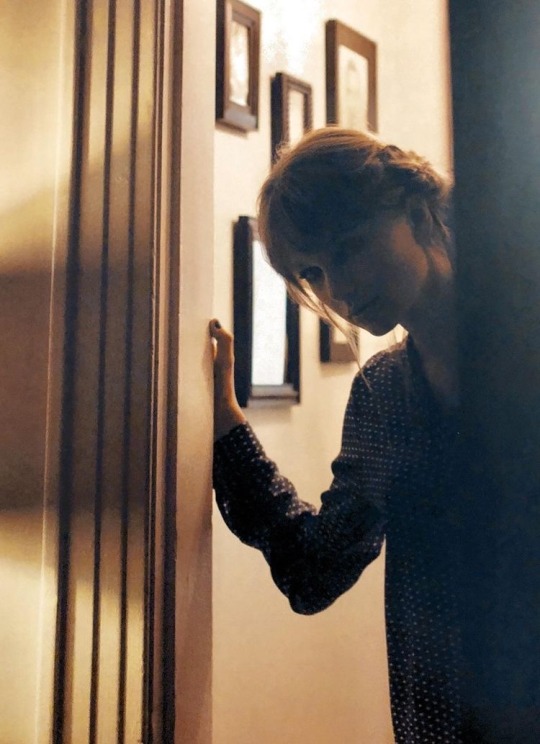
my thoughts about folklore so far <3
i solemnly believe that taylor swifts new album could redefine writing in the music industry. the storylines .. the passion ... the “fictionalised” scenarios that speak with the audience and let them resonate with each song depending on who they are as a person , wether they identify as straight or gay or bisexual. She did not write her 8th album for financial gain or worldwide recognition and although she had sold 1.3 million copies already since the release, it’s clear that it wasn’t about that, and instead to show a true reflection of her soul without the media getting a say before the release , much like Lover, reputation.
it was about finding herself during this period of reflection, being her most genuine and raw self, the explicitly of her lyrics, despite being vague so the audience can see themselves through what she is saying speaks volumes.
along with this, she has proved in this album that she isn’t just some pop writer of heartbreak anthems, she has inner battles, and her songwriting should not be defined by her relationships, past or present.
her album to me personally, speaks about heartbreak, from a young age, along with finding yourself along the way, that all the relationships and scenarios in her life have made her the way she is, that she understands that her heartbreak has created the mindset towards relationships , sexuality etc.
ALSO ITS JUST SO SAD AND NOSTALGIC AND THERES BON IVER AND ITS 2:20 AM AND ITS JUST A LOt SO MOST OF THIS WONT MAKE SENSE
does this album feel like climbing a mountain and seeing the view at the top , and just reflecting on everything that’s happened, the climb and the people who helped you get to the top, wether it was a negative or positive relationship, i genuinely can’t explain the vibe other than damn taylor this seems kinda sapphic, and also WAYYYYY more swearing which i love, taylor swift saying “ mouth fuck you forever” is probably the most satisfying thing ever i don’t know what it is.
alternatively the album could be seen as taylor looking back at her experiences as a younger woman , when she was 17/18 and the things she experienced which helped her get to this point , wether that was discovering parts of herself, which is again exploring now in solitude as shes had lots of time for reflection and self growth.
The woods in her album promotional shots, and the white cardigan, dress and rawer photography style, specifically the vintage black and white film look could also explain the nostalgia she feels now shes had time to look back, and as a 17 year old girl myself , her lyrics speak to me in a way in which her other album have never done before , the uncertainty and certainty of what she wants and what she doesn’t want, the desire to be with someone ( listen to cardigan, illicit affairs, betty august, seven) regardless of what others think about them.
whilst it’s important to notice the queer undertones of her entire album, we cannot forget that the albums nostalgia and sad tone creates the themes of heartbreak, and perhaps looking back at mistakes made.
lyrics that speak to me:
“ i think i’ve seen this film before, and i didn’t like the ending” - talking about her failed relationships / and or , the relationships which she felt she could’ve done better in, and looking back onto them, showing she disliked the way which she/ or the person acted to make the “film” end and for her to snap back into reality, out of the safe bubble which was the relationship.
“wishing i could write my name on it”
“ i had the shiniest wheels, now their rusting”
“ i was so ahead of the curve, the curve became a sphere”
“ and we can be pirates, then you won’t have to cry”
“ now i breathe flames each time i talk// and women like hunting witches too”
“ all these people think loves for show but i would die for you in secret” - this lyric simply states taylor’s love and adoration for the person, whilst she might want to be loud and pubic, she is willing to “die” for the person in secret, meaning she’s happy just to be with that person, in love and happy just to show it to that person, and not having to be forced to do or say anything for the media’s consumption.
ialso think everyone should stop placing labels onto her , yes i’d absolutely love it if she was bisexual/ into women and that kaylor had been real, and that all the men she had been with she was just bearding for, however we need to keep respectful as it’s not fair to insinuate anything about a women that we only know through her songs and some fan interactions with her. whilst betty, august, illicit affairs etc seem to be sapphic ( HELL YEAH, Go taylor) we need to remind ourselves as fans it’s not our place to say that a certain song means something, especially what it means to the artist, we will never know the true meanings behind many of her songs, so let’s keep the vibes positive and not place labels onto people who obviously support the LGBTQ+ community regardless of how they feel about the same sex
thankyou for coming to my ted talk and stream Folklore !!!
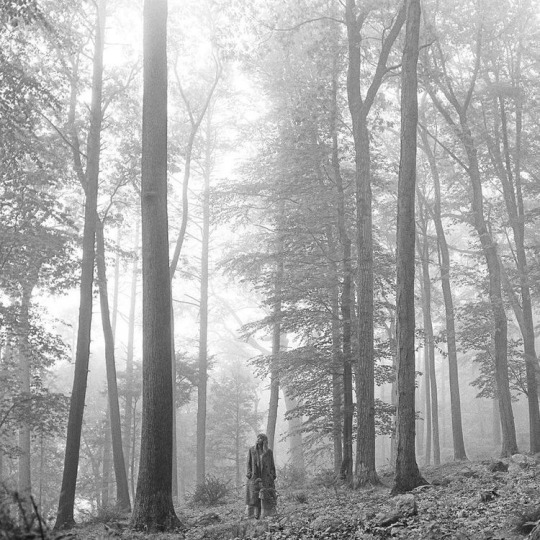

104 notes
·
View notes
Text
I think the thing that really frustrates me re: Destiel is that...well, there has never been any significant speculation/argument about whether or not Castiel had feelings for Dean.
At least, not any that was consistent or loud enough to be a big or dominant part of fandom discourse.
(Putting in a read more here because there are just a lot of Feelings I have about this nonsense that are nowhere near coherent)
The argument has always been about whether Dean could possibly have a romantic and/or sexual attraction toward Castiel. Whether it “makes sense” that Dean, a man who likes beer and classic cars and 70s-80s rock music and weapons and sex with women can also be a man who has romantic and/or sexual feelings about his best friend, who is (or appears to be) a man.
This disparity between how Dean’s feelings are viewed versus how Cas’s feelings are viewed has just become stronger in recent years, not only because the writers have given strong textual support for Cas’s feelings since season six, but also because Cas’s actor has been very vocally supportive of the ship, whereas Dean’s actor has been mostly very negative towards it, when he spoke about it at all.
And I’m not here to debate how actors’ feelings do or should affect fanon or canon. But the fact that one actor says “we know what’s going on” while the other says “it’s not real” absolutely has had an affect on how fandom talks about the ship, and absolutely affects what is needed for the ship to be acknowledged by the show as canon.
These arguments and this disparity have always been frustrating for me, primarily because the idea that this needs to be argued at all is 100% a product of heteronormativity and biphobia. Dean’s interests and appearance scream “Red-Blooded American Male,” and the idea that the red-blooded American male could ever be in love with another man upsets some people. Yes, even some people who would not consider themselves homophobic, biphobic, or heteronormative.
Castiel, as a genderless being merely inhabiting a male body--and who we have seen inhabit a female body twice throughout the show’s run--doesn’t grate against a binary understanding of gender and sexuality as much, partly because he’s already visibly transgressing the gender binary from the moment we meet him. As counterintuitive as that seems, I’ve constantly seen it in fandom and in real life as well: the person who is obviously flouting the “rules” of heteronormativity being queer surprises no one. The person who appears to follow those rules only to buck them later incites a specific kind of anger: the anger of people who feel lied to.
Dean, who exists firmly on one side of the gender binary from the word go, makes audiences more uncomfortable when he is queered by fandom because when you look at the show with heteronormativity goggles, there are no “signs” to clue you in. And sadly, many fans still, in the year 2020, want to believe they can “tell” if someone is queer just by looking at them.
For those of us who are bisexual who see ourselves in Dean, and have seen ourselves in Dean since the beginning, this is endlessly frustrating. I want to both scream to the rooftops that there is no one way that bisexual people look, and at the same time scream “what are you talking about? It’s right there, how can you not see it?” It’s certainly an...interesting dimension of erasure, to have someone look at a character so much like you and say they can’t possibly see you there, because X thing (that also applies to you) is fundamentally at odds with the possibility of you being there.
Did that sentence hurt your brain? Welcome to my life.
There’s also been a not-insignificant camp of people in the fandom who separate Destiel from bi!Dean headcanon, insisting Destiel wouldn’t matter if they just made Dean canonically bisexual. This argument is something I might have been able to get behind. In seasons four and five, or maybe seasons nine and ten.
But not in season fifteen. Not when the only significant relationship Dean has had, consistently, with someone other than his brother, throughout most of the show’s history, has been with Castiel. Not when 95% of the textual and subtextual evidence for Dean’s bisexuality is in relation to Cas, and not when there’s no time left in the story to explore Dean’s attraction further than simply pointing backward at what came before.
Not when the in-show queerbaiting is all in relation to Dean’s relationship with Cas.
Not when the question since season 9 at least has not been “will they/won’t they” but “when will Dean get a clue and make it clear to his life partner that he matters and their bond is reciprocal?”
The only way the writers have left to textually avoid solidifying the show as the longest case of queerbaiting in television history is to have Dean acknowledge and return Cas’s feelings before the final episode ends. That’s it. That’s all. Castiel’s confession on its own is not enough, and is arguably just a slap in the face to fans who have known for years that Castiel was in love with Dean, who have only been waiting for Dean to acknowledge that he is also in love with Castiel. That he is capable of loving Castiel back.
So if that love confession is all there is? That’s low. That’s worse, in my opinion, than if they had never acknowledged anything at all. That’s the kind of slap-in-the-face bullshit writers pull when they want to punish the audience for wanting something.
And yes, it is queerbaiting. It is wildly queerphobic writing. And it’s just a shitty, shitty thing to do to fans after all this time.
18 notes
·
View notes
Note
Hi! I've been thinking about this blog and allo-aro and aro representation a lot lately because a writing community I'm in has been having a huge problem with this, and I was wondering if you had any tips I could pass on regarding properly writing and portraying allo-aro characters? Thank you so much in advance!
Well, what kind of allo aro characters? Are you writing fantasy novels? Historical? Realistic fiction? Sci-fi with a cast of aliens? Romance novels? Bodice rippers? I really can’t give especially good advice if I don’t know the specifics. If you’ve got anything you want specific advice on, let me know.
In general, I’m going to say what I would hope would be extremely obvious things, but apparently people still need them to be spelled out for them! Love the lack of compassion for y’all’s fellow human beings I see from writers sometimes. Anyway.
Say the word out loud. Don’t ever just leave it at “ohhhh they had sex but they do not get married in the end! Wow!!! Alright gang it’s been a good run but that’s enough representation for the day, let’s pack it up.” If at all possible, never just imply representation; Say it out loud. In the actual text, not on Twitter. And I’m not saying you have to open up your novel with “Sheila was allosexual aromantic”- There’s a lot of different ways you can “say” it without just filling out a profile. You could do something like:“Hey, Sheila, you’re a lesbian, right?” John asked. “Nah, actually, I’m bisexual aromantic,” Sheila replied.Or:Sheila glanced up at the aromantic flag that hung on her wall, trying to mix the right shade of green for the painting.Etc.
I cannot emphasize this enough: Don’t, don’t, DON’T apply “predator” or “player” stereotypes to your allo aro characters. Yes, there is room for nuance, but you should never be like “Yeah here’s Fuckboy Steve, he hates women and likes to go out to bars and get women super drunk before having sex with them and then leave them without a word in the morning because he doesn’t care about them and is incapable of forming real human connections, but he’s aromantic! Yay I’m winning representation!”
In general, if you’re writing an allo aro character, ask yourself: Why? Why am I writing them in the way that I am? Have I talked to actual allo aros? What are they like? Am I writing this character the way I am just because, or am I writing them this way based on assumptions about what I think allo aros must be like?
Write your allo aro characters as characters first, allo aros second. This obviously is something that should be followed any time someone sets out to write a character of x identity.
Make them main characters! It’s always disappointing to hear about representation that turns out to be like, a minor character in a novel with a big romantic plot. We want to see ourselves, not catch a brief glimpse of a sliver of hair before some couple blocks the view by making out right in front of the mirror.
Allo aros should not exist soley in tangent with romance and sex. A lot of us are uncomfortable with romance, and frankly, like... We have lives outside of hookups.
By all means write diverse allo aros, but also be careful of intersectionality and how negative stereotypes about different identities come into play. Is your Hispanic allo aro falling into the “spicy Latina lover” stereotype? Is your pansexual aro falling into the “fucks anything that moves” stereotype? Allo aros are diverse and everyone deserves to have our identities represented, but please do so carefully.
160 notes
·
View notes
Text
Scenery
Pairing: SF9′s Youngbin x OC [Seul] || TBZ’s Sangyeon x OC [Yeon] ] Genre: slice of life, slight fluff Word Count: 3,453 Summary: Seul and Yeon are having a female-only bonding time before attending to their respective bosses after the outing.
Warning: none... i’m pretty sure.
hello! it’s been awhile hasn’t it? had writer’s block but eventually found some inspiration and came up with this. anyways, this is the Office Life with Yeon and Seul which i’ll make a separate post soon as it’ll get crowded later if i continued writing for these pairs lol but yeah, i think that’s about it. so happy reading and kthxbai, Admin Lia~
Yeon held a large leaf in hand whereas Seul held the clear umbrella over them with one hand as the sisters looked at one another with smiles on their faces to which they posed for the so-called candid shot in request of their mother and soon-to-be stepmother.
"Ooh, lovely, girls!"
Narae exclaimed as she proudly took the picture of her two daughters before looking over at her ex-husband's fiancee.
"Don't you think, Sanghee?"
"Yes, Narae. They're quite lovely."
Sanghee then glanced at Jangmi in her arms.
"Right, Jangmi? Mommy and Auntie Yeonnie looked pretty, huh?"
"Pretty! Pretty!" Jangmi cooed with a laugh as Sanghee continued speaking.
"That's right. You can't tell that they were annoyed with us at all throughout the day."
Jangmi agreed with a happy-go-lucky attitude as the older women chuckled leaving the younger two to eyed them a bit annoyed. Of course Jangmi had no clue what was going on besides knowing that she was having a grand time.
"Obviously." Yeon curtly responded while fingering the plant between her index finger and thumb before handing it to Jangmi.
"When y'all wanted to talk about the future of our soon-to-siblings, I didn't expect to be out here at Dream Forest having a grandmother-mother-daughter-granddaughter-auntie-niece whatever bonding time."
"Yeah," Seul agreed while handing the clear umbrella to her daughter as Sanghee set her down as the little one ran about them.
"Although I don't really mind, but we haven't even talked much. Just sight-seeing."
"If we did that, then we knew that Yeon wouldn't come." Sanghee explained with a knowing look.
"Um, yeah."
Yeon shot them a pointed look.
"I wouldn't even be wearing this dress if it was my choice."
"But you look so beautiful, my daughter." Narae cooed. "I can't imagine how you'll look at the wedding for Sanghee and Kisuk soon."
"Or for yours and Yongin." Sanghee added with a similar attitude.
Both women gushed at the idea of their weddings, but also that the other three would be a part of it. Yeon's face scrunched at both possibilities being very likely soon as Seul shoulder her with a mischievous look.
"Yeah, two events where you'll have to be all dressed up."
"Ugh. Don't remind me. I still have to go dress shopping for Sanghee's engagement party."
"Yeah, you still have several weeks before then." Sanghee smiled as Yeon sighed tiredly.
"But I still have to get dressed up."
"Oh, you'll live." Narae told her eldest daughter before taking another photo with a grin.
Narae took a few more of her granddaughter.
"No wonder you get that from her." Yeon remarked to Seul as the younger sister chuckled.
"Yeah, yeah. Anyways," Seul changed the topic, "What else is on the agenda for today?"
"Nothing really." Narae answered with Sanghee nodding.
"Yeah. We mainly just wanted to get away for a few hours."
"Seriously?"
Yeon was not amused.
"We could've gone literally anywhere outside of Seoul for a better scene."
"Well, technically, it was more for the two of you then us." Narae explained with a sheepish look. "Sanghee mentioned some incidents at work and we both agreed that the two of you needed some relaxation in your schedule."
Sanghee held up a hand in her defense.
"To be truthful, it was just our idea. Kisuk is still unaware that the two of you work at EDAM since the both of you have applied under an alias."
"Okay, but y'all still could've just told us that, too." Seul said with a firm tone. "It's not like we're three."
"That's quite true." Narae agreed before shooting her daughters a knowing look. "But the same goes for the two of you when applying for a job outside either family's workplaces. You could've just rejected the positions we had aligned for you."
"Nah, Dad would've forced us either way."
Seul remarked as Sanghee nodded knowing that was the truth.
"Yes, that's true. Kisuk seems like the type."
Narae changed the subject a second later.
"Yes, he very much is. Anyways, let's get lunch on our way back home. Jangmi you're hungry, right?"
"Yeah! Food! Let's go!"
Jangmi charged on ahead as the umbrella and leaf in each hand moved about her in motion while the quartet followed suit with smiles on their faces. The quintet enjoyed a nice meal at a nearby restaurant while discussing Sanghee's engagement party as well as the future of the newborns. After that both Narae and Sanghee went about their own day leaving the trio to return home after stopping by a bakery along the day.
"Can Auntie have some of your milk bread?"
Yeon asked her niece while placing her hand near the said dessert.
"No."
Jangmi declined with a giggle as she moved the treat away from Yeon's reach.
"Are you three, too?"
Seul questioned her sister with Yeon frowning.
"Um, yeah I am because that was mine before your daughter wanted to trade because she didn't like the mango yogurt."
"Then you should've just ordered her the same thing than let her decide."
"Yeah, I know, but I wanted Jangmi to decide for herself since she liked how the drink looked."
Yeon went back to eating the yogurt while watching her niece happily tear apart the milk bun. Seul scoffed with a knowing smile.
"Sucks for you."
Yeon ignored her as Seul answered a call that came shortly after.
"Hello?"
Seul immediately muted the call while facing her sister.
"Um, it's my boss. I'll be back."
Seul patted her daughter's head.
"Mommy got a call, okay. Be good for Auntie Yeonnie, okay?"
"Otay!"
Jangmi responded cheerfully as Seul cast the two a smile before standing and walking out of the shop. Yeon watched her sister before facing her niece.
"If auntie buys another one, then you won't take that one, right?"
"No."
Jangmi giggled while chewing a piece of the condensed milk bread as Yeon knew that her niece was lying, but smiled anyways.
"Hey," Came Seul's voice as she returned, "I have to run some errands for my boss. Will you be able to watch Jangmi alone?"
"Yeah. I'll be fine. Do what you gotta do." Yeon told her sister.
"Thanks."
Seul patted her daughter's head.
"Mommy gotta work. Be good for Auntie Yeonnie until I'm done. Okay?"
"Otay. Love you."
Jangmi puckered her lips as Seul leaned closer for a kiss on the cheek.
"Thank you, and Mommy loves you, too."
Seul returned the same gestured before leaving with the umbrella that Yeon handed to her.
"Okay, so it's just you and me, MiMi. What do you wanna do after this?"
~~~~~~~
"Thank you for taking care of this errand on short notice, Ms. Lee. I really appreciate it."
Youngbin thanked Seul with a grateful smile as she brought him the Milkis cake from Tous Les Jours for a business function at the Four Seasons Hotel. He noticed her attire with a slight frown as the pair met at the front desk.
"I didn't pull you away from a previous engagement, did I? You didn't get caught in the rain either, I hope."
Seul shook her head.
"Oh, no. You didn't and the rain was very light out, but you're welcome, Mr. Kim. Luckily, I was nearby after an outing with family."
She vaguely informed him as she knew that Youkyoung was supposed to have ordered the cake and have it deliver beforehand, but no order was made and it left Seul to scramble at the last minute on her boss' behalf. Youngbin was unable to get a hold of his secretary as well.
"Oh, okay. That's good to hear."
Seul cast him a small smile.
"Will there be anything else, Mr. Kim?"
"No. I should be fine now. Thank you, Ms. Lee."
He looked about him before returning his gaze onto his personal assistant.
"Hopefully Ms. Seo will arrive and I won't have to bother you too much."
"Well, I am your personal assistant and it is my job to take care of errands and other miscellaneous things that Ms. Seo is unable to."
"Yes, very true. Well, Ms. Lee, have a wonderful evening."
"And the same to you, Mr. Kim."
Seul cast him one more polite smile before turning away. Her attention soon drifted to another part of the lobby upon recalling Sanghee wanted to have her engagement here at the same hotel. The hall was large and consisted of an indoor pool along with an amazing view. This piqued Seul's curiosity as she entered.
"Wow, this is really pretty."
She said to no one in particular as she moved closer to view the outside better, but avoided being close to the pool itself as she didn't have spare clothes to change into if she did get fully wet.
"No wonder Sanghee wants her party here. This will definitely be beautiful at night."
There were other guests of the hotel and of the business function scattered about in the room as well.
"Whoa, Yiseul Park, is that you I see looking so lovely right now?" Dawon said with a surprised teasing tone in seeing his friend and fellow colleague.
"What are you doing here?"
Seul turned and made a face at him using her real name.
"It's Seul Lee, remember?"
"Oh, right. Work-related. You and Yeon both. My bad."
Dawon chuckled as he neared.
"I thought you were on a family outing. Why are you working?"
"Youkyoung didn't bring the cake for your boss and I had to do it."
"He's your boss, too."
"Mmhmm. Anyways, why are you wandering around? Shouldn't you be mingling with the others and assisting Mr. Kim and what not?"
"The talk gets boring over the years and they have really long speeches that really makes no sense to which I don't have to listen in on as that's Youngbin's job. Anyways, I'm also trying to avoid a certain someone at the moment and do not want to meet their boss. By the way, you looked good in that dress."
"Thanks. You're not so shabby in your own get-up."
Dawon made a face.
"It's gets stuffy at times, but I can't wait until this is over and I could get out of this."
Just as Seul was gonna comment she was suddenly bumped from behind and stumbled into the pool.
"Yiseul!" Dawon called for her while turning to face the person that caused it.
"Seriously, Yuri?"
"It was an accident. It's not like I purposely did it."
Yuri countered. She was the person he was trying to avoid
"Right and the fact that you didn't fall in either."
"I righted myself before I could."
Dawon ignored her.
"Yiseul!"
Seul resurfaced as she tread water to stay afloat while making sure all of her belongings didn't float away. Dawon called his friend's name and she waddle on over to him.
"I got you."
Seul reached for Dawon's outstretched hand as he pulled her closer to the edge of the pool. She coughed up the water as she breathed in air until her breathing returned to normal.
"What just happened?"
She looked at her friend as he motioned with his head towards Yuri.
"She happened."
"Who's she?"
"The one I mentioned earlier."
"I see."
Before Dawon could help Seul get out of the pool, Yuri pulled him away.
"C'mon. My boss is looking for you."
"Let go. I have other things to worry about."
"But she wants y-"
"I don't care."
"Dawon. It's fine. Just go before something else happens."
Seul told him as she managed to lift herself out of the pool and sat beside it.
"But-"
"I'm fine. Really."
"See, she's fine."
Dawon's jaw tightened as he looked at his friend. Seul gave him a nod that she was fine.
"C'mon, Dawon, let's go."
Yuri urged as she continued to pull on Dawon's arm. He shook her hold off of him with an annoyed look while casting his friend a worried look.
"Just call or message me when you get home. Okay?"
"I will."
"Alright, then. Take care."
"You, too."
Dawon cast Seul another concerned look before turning around and walking off. Yuri followed after him and tried to hold his hand, but he shook her hand away. Seul sighed wondering if the other woman thought she was competition, but recalled that she was the younger sister of Yuna. Seul scoffed at the idea that Yuri still clung to Dawn even after school when she knew that he would never like her back like that. Seul dismissed the thought as she wrung out her hair and dress with an even deeper sigh. Despite the whole dress being white she was glad that it wasn't see-through. She needed to dry off soon before returning home. Just as she stood up and had turned around, Youngbin was there with a towel for her.
"Are you cold?"
She eyed him weirdly not taking the towel.
"How long have you been standing there?"
"Not that long."
He continued to hold the towel for her to take. She tentatively took it.
"Thanks."
"You're welcome."
She placed it around her shoulders and noticed that he was still standing with her with no cake in hand.
"Shouldn't you get to the event?"
"Just some speeches going on that I just have to make sure to check in every now and then."
"Mmhmm. Well, thanks again. Where do I return the towel?"
Seul had removed the towel from around her as she used it to dry off the rest of her.
"Oh, they have a hamper at the changing room over there."
Youngbin pointed to the other side of the room that had a small area that disappeared around the corner.
"Okay, thanks."
Seul was about to walk off, but Youngbin stopped her.
"Hey, wait."
She watched as her boss began removing his suit jacket.
"Um, what are you doing?"
He didn't answer, but instead draped the fabric over her shoulders. He cast her a cheeky smile as he secure the jacket upon her.
"You can return it the next time you see me."
"Bu-"
"Sorry, gotta go. It's in your care for the time being."
Youngbin rushed off with a playful smile as Seul was left staring after him with furrowed eyebrows. She sighed, but nuzzled into the warm clothing.
"He's so weird. I'll see him the day after tomorrow."
Seul didn't ponder on it for long as she returned the towel, made a call to her sister using the front desk's phone, and drove to meet them as Jangmi wanted to go shopping.
~~~~~~~
"Okay, MiMi. Mommy needs new clothes. Let's find her some."
Yeon informed her niece once they were on the fourth floor of the Shinsegae Department Store and had entered Lucky Chouette.
"Why?"
Jangmi asked while holding her aunt's hand as Yeon lead the both of them around.
"Something happened when she left. Let's pick something Mommy would like."
"Otay!"
Yeon received the call from Seul after she had explained what had occurred. Yeon thought it was stupid on how that played out, but told her sister that she was lucky she was in Myeongdong. Now here she was looking for something that Seul could wear for the mean time until they all got home. Yeon remembered her niece still had the plant from earlier and wondered why she hadn't tossed it.
"Jangmi. Why are you still holding the plant?"
"Because it's nice."
"I know, but it's becoming dried up. Let's toss it, yeah?"
"No. Auntie gave it to me."
"I know, but it'll ruin the other things here."
Jangmi frowned.
"But, it's so pretty."
Yeon reasoned with the child.
"Nex time, Auntie will give you something else, okay?"
Jangmi beamed as she handed her aunt the plant.
"Otay. Promise."
"Thank you and yes."
Jangmi giggled as she wandered a bit to choose something for her mother to wear as Yeon sighed with a smile. She knew her niece liked the piece of nature, but she really didn't want the toddler to spread it throughout the store and cause the staff to be inconvenienced. Yeon placed the plant inside her bag before focusing her attention on something for Seul to wear. Yeon had chosen a few pieces of clothing when she heard her niece called for her.
"Yes, MiMi?"
Yeon glanced at Jangmi and noticed that a little boy was with her. She kneel to be at eye-level with a concerned look.
"Hi. Jangmi, who's your friend?"
"This is Howon. He lost his uncle."
She introduced the other toddler as Howon held back tears, but still sniffled.
"Oh. Well, hi, Howon."
She glanced about her and wondered if the boy's uncle was still in the store or something. Yeon stood again to scout for the boy's uncle, but there were only other females walking about. She kneel to Howon's eye-level again.
"Um, where was the last time you saw your uncle?"
"I don't know."
The boy replied and Yeon wondered how she was supposed to find his family member.
"Okay. Let's go to the front and see if we can find your uncle, Howon."
Yeon decided to head to the front to purchase the clothes while informing the staff of what had occurred. Just when Yeon was informing the boy of his new situation, Howon became upset. In the end she left her contact with the staff while Yeoon took both children to Vecchia e Nuovo which was a restaurant and bakery on the same floor as Lucky Chouette. Both children were hungry and Yeon thought it would be better if they were still in the same area for the uncle to find his nephew. After ordering Yeon messaged Seul about the situation and a moment later her boss' name popped up calling.
"Hello, Mr. Lee?"
Yeon answered with a confused tone.
"Uh, yes. I'm Yiyeon Park. How do you know that? Oh, uh yes, he's with me."
Yeon glanced at Howon learning that he was the nephew of Sangyeon.
"Um, we're at Vecchia e Nuovo. Uh, yes, we've already ordered."
The pair were too engrossed with the menu as they made a game out of it to listen in on Yeon's conversation.
"Yes we're on the fourth level. Ah, yes. See you soon."
Yeon ended the call while looking over at Howon.
"Howon, you're uncle will b-"
"Uncle!"
Howon exclaimed upon seeing Sangyeon entered the restaurant a moment later. Yeon's gaze went to the male as she watched the pair soon hug while her boss informed his nephew that he shouldn't have wandered and all that other stuff. Sangyeon's attention went to his secretary.
"Thank you for watching him, Ms. Lee."
"Um, you're welcome, Mr. Lee."
"Hi."
Jangmi greeted Sangyeon with a smile upon remembering him.
"Hi, to you, too."
Sangyeon greeted in a softer tone than he did Yeon.
"Did you and Howon become good friends?"
"Yes!"
"Yeah, Jangmi gave me this."
Howon held the leaf that Yeon had put away earlier. She couldn't resist the pair when they begged to see and play with it.
"Yeah, it's a token from something earlier today."
Yeon shot Sangyeon a small smile hoping he wouldn't probed further.
"I see. Did you say thank you?"
"Mmhmm."
Soon the staff brought out their meal and Yeon suggested for Sangyeon to join them so that Howon could eat before leaving.
"I want to sit next to auntie." Howon stated as he moved to sit next to Yeon.
"You don't want to sit next to me?" Sangyeon asked.
"Nope."
"But I want to sit next to auntie." Jangmi whined as she stood off to the side.
"You can sit next to uncle." Howon suggested, but Jangmi frowned.
"No."
This caused Sangyeon to slightly pout as he played along with the kids.
"No one wants to sit next to me?"
The pair shook their heads as Yeon stifled a laugh which caused her boss to glance at her. Upon seeing his supposed hurt look Yeon couldn't help but let the words flow on out from her mouth.
"Are you jealous?"
"Not at all." He replied nonchalantly while composing himself.
"I see."
Eventually, Yeon managed to get Howon to sit with his uncle leaving Jangmi to sit beside her. It wasn't that bad as the quartet ate and talk for a while before Seul messaged her sister. Yeon decided to cut their meal short after informing Sangyeon about the situation with her sister. The four bid one another goodbyes before parting. Yeon hoped that her boss wouldn't ask about her real name and just let things be, but she received a messaged later that day with him asking if he should address her with Park instead of Lee. Yeon didn't respond and would deal with it on Monday.
3 notes
·
View notes
Text
Anonymous Asked
(post #5 in the “Tumblr ate my asks” series)
“No pressure if you're short on time since I know there's a lot to say about it, but I would love to hear your thoughts on the relationship between Amy and Selina”
Hi Anon - you sent this in weeks and weeks ago, and I’m sorry it took me ages to get around to it! But the question has been on my mind recently as I’m rewatching S3 and writing the next chapter of BMTL.
What I find kind of interesting and frustrating about Selina and Amy’s relationship as presented on the show is that it’s a bit opaque compared to Selina’s other relationships (or Amy's with Dan, her other primary emotional foil on the show). We know virtually nothing about how Amy came to work for Selina (other than that she must have been quite young) or what she did that made her so invaluable; the most evident dimension of their connection—the fact that they are two women in a heavily male-dominated workspace—is never addressed explicitly by the writers. From the very beginning of the series, Amy has to try and defend her close relationship with Selina, but since we didn’t see how they became so close…to me, it always feels a little like there is something missing, in the way their connection is laid out.
I think the pilot actually works well as a kind of microcosm of Selina and Amy’s dynamic as it plays out through the Iannucci years of the show. Amy is presented as Selina’s right-hand woman; Selina clearly regards her as the smartest person on her team and has some measure of her respect for her that she doesn’t have for, say, Mike. But by the end of the pilot, she’s also gone over Amy’s express recommendation (hiring Dan) and has no objection to Amy performing a humiliating and sexist task (go on a date with Jonah in exchange for fixing the card situation). This is the dynamic that plays out through S4—Selina turns to Amy last and often only when she feels she’s truly backed into a corner and/or can’t discuss a particular issue with the men on her team. There is something very intimate about this kind of relationship, of course, and it’s drawn in deeply emotional terms. But in exchange for this particular kind of political intimacy, Amy has to fake a miscarriage, flush Selina’s toilet, get picked last for campaign manager (and only after she sabotages Dan and thus the very campaign she wants to run), and essentially watch Selina make increasingly bad political decisions based on advice from her current favorites while ignoring whatever Amy tells her. And one might say the tragedy of Amy’s character is that she endures these indignities not because she’ll get fired if she doesn’t do them (although that is literally true in some cases), but because she clearly derives a lot of her personal and professional self-worth from doing Selina’s dirty work. To a certain degree, and in face of stark evidence to the contrary, Amy believes that her willingness to do these things means that Selina values her the most of all.
That all sounds a bit darker than I mean it to. Of course Amy does experience small moments of genuine triumph under Selina, and she obviously wrestles with the uneven terms of their relationship during the first four seasons of the show—she thinks about jumping ship in S2, we see it dawn on her in S3 that Selina is basically her entire life in a way that probably isn’t healthy, she goes through phases of trying to develop some kind of life outside her work. Her own personal ambition is also a huge part of what’s going on. She’s very invested in the idea of being the managing force behind the first female Vice President (and President) and that helps her put up with Selina's most infuriating qualities as a politician. And of course, she does ultimately quit mid-way through S4, as she comes into this realization that she got her chosen horse into the White House and it’s a fucking disaster.
As for Selina’s side in all this…this is where the opacity of their relationship really features for me. I admit, I don’t quite understand viewers who talk about Iannucci-Selina as if she is Amy’s endlessly supportive older gal pal. Selina says more nice things about Gary in the early seasons of the show than she does about Amy. Yes, she obviously sees Amy as someone who can perform a certain kind of emotional labor for her and she relies on her greatly for that. Selina is very isolated emotionally, and I think Amy’s presence in her entourage as a young woman who is personally and professionally devoted to her is very reassuring to her, even if she doesn’t really realize it until after Amy leaves. This is something @thebookofmaev pointed out to me and I think it's quite telling: Selina reacts to Amy’s resignation in S4 by arranging “girls night” with her old law school friends, which she obviously finds excruciating. It’s significant to me that Selina is trying to fill an emotional hole, rather than a political one. While it’s obvious Selina generally prefers the company of men, there is something in her relationship with Amy that I think she finds very uncomplicated and soothing in a way she doesn’t find any other relationship on the show. She needs Amy for the moments of emotional extremity that Ben can’t handle. But considering how she treats Amy outside of those few moments, it's hard for me to view the relationship as one between genuine equals (not to mention the literal power imbalance between them). She needs Amy when she needs her and there’s no space for anything else in their relationship.
Amy returns to Selina in the S4 finale and it’s clearly a deeply psychological impulse more than anything else, more to do with herself than Selina, I would argue. It’s one of Amy’s most honest moments in the whole show—she can’t not be there after spending so much of her life invested in getting Selina elected. Selina collapses in her arms and wails that she should never have left and it’s genuinely moving and borderline romantic…and then she tells her supporters at the election rally that Amy took time away because she had a mental breakdown. Plus ça change.
Unfortunately, we can’t know what Iannucci had planned for Amy and Selina…I suspect we would have seen a few more “break-ups” in their relationship as it became increasingly unstable, and Amy would continue to wrestle with the costs of remaining within Selina’s orbit. Obviously (as a Dan/Amy shipper, haha) I think Dan would have been part of that journey for her…S4 is pretty explicit (in my opinion) about the fact that Dan now officially occupies the third point of the triangle between Selina, Amy, and some semblance of a life, not to mention the fact that the Dan/Amy/Selina triangle is a major structural anchor of the show in its own right.
Of course, one of the greatest objections fans had to Mandel as a showrunner was his approach to Amy and Selina’s relationship, largely driven by Selina’s transformation into the ultimate mysogynist. I don’t agree with this interpretation of Selina, but I do think the deterioriation of Amy and Selina’s relationship is very plausible even under Iannucci. Amy has to leave Selina at some point, like most strategists move on from their bosses if they want to remain politically relevant. But Selina's attachment to Amy is primarily emotional and not political, and Amy permanently moving on from her would be a bitter pill for her to swallow…she clearly views Dan and Amy at PKM as non-WH extensions of her staff, but Amy leaving to work for another politician, especially a female one, would be unbearable for her. Similarly, I do not think any version of Selina would react well to the news that Amy was going to have a baby. We can’t know if this was a sure thing in the Iannucci Veep universe, obviously, but considering how she reacts to Mike potentially becoming a father…I just can’t see Selina embracing the fact that someone else is going to have a superior claim on Amy’s time and energy. (But I also don’t think Iannucci-Selina would ever order Amy to have an abortion, of course.)
My fic, Bring Me to Light, is exploring this theme to a certain degree. It imagines a future in which Amy has fully invested in a life outside of Selina, and when her old boss makes a reappearance, Amy struggles with old professional demons (and of course, because I’m the author, she has to reckon with Selina and Dan’s separate professional relationship as well 😈)
Well, this turned into quite an essay, so I’ll stop there. You’re right, Anon—there’s so much to say!
12 notes
·
View notes
Text
police violence and propaganda in ITV’s Endeavour
“That’s not what my dad says... he says you’re all bastards.” - Tommy Cork, Endeavour, ‘Neverland’.
- first of all, I’m white, so if any black people or other poc want to weigh in, please please do. this isn’t going to be a post about race specifically (mostly because there’s barely anything to talk about, Russell Lewis loves him some white characters) but obviously since a hugely disproportionate amount of police violence in real life is towards black people, that has to be a part of the conversation.
- second of all, all cops are bastards. yes, in the uk too.
- it’s not like i’ve seen anyone in the fandom defending fictional police officers or anything (unlike, say, some people in the brooklyn 99 fandom), so this isn’t a response to anything i’ve seen, but if we’re all going to be stanning a cop show i think this needs to be addressed.
- i’m not any kind of expert, i’m just taking information i’ve learnt elsewhere and applying it to Endeavour.
- i’m very willing to debate on stuff, but read the whole post before you do.
Police corruption
so, the overarching plot in Endeavour, from the pilot to the season 6 finale, is police corruption. However, the corrupting influence is not the police force itself. Instead, it’s the Freemasons, a “secret” society. All the corrupt police officers in Endeavour, from ACC Deare to DS Chard to DS Lott are either Masons themselves, have Masonic connections, or are being bribed/blackmailed by Masons. The point of the corruption plotline is that the police are not corrupt themselves, it’s an external influence that is causing the police force problems. Our main characters are the good police officers!! They hate corruption!!
Fred Thursday
Fred Thursday is a narrative foil for Morse. His family life is a reflection of what Morse doesn’t have. This is a large part of season 1, mostly in Fugue and Home. However, he also does morally ambiguous things that Morse doesn’t agree with. For example, in the season 1 episode Rocket, Thursday is xenophobic towards a German engineer, which Morse is vocal about disagreeing with. We the viewers aren’t supposed to agree with Thursday about this, but there’s never a point where Thursday goes ‘oh yeah I probably shouldn’t hate this German dude who obviously isn’t a nazi’. He keeps his views, and this is never addressed again.
In the season 5 episode Quartet, Thursday covers up for a woman who pushed her abusive husband down the stairs, saying that he must have tripped. Morse also vocally disagrees with this. However, I think the writer intended Thursday’s actions here to be more sympathetic. Which yeah, fair enough, right? The wife doesn’t deserve to go to jail for defending herself. But the problem here is Thursday’s interpretation of justice. At no point, even after seeing evidence of domestic abuse towards the wife twice (and it’s implied that there was more that occurred prior to the episode that he knew about) does he arrest or question the husband. He thinks that because the husband died, that’s justice done. He didn’t actually try to carry out justice using the legal system. And I know that legally domestic abuse can be a tricky thing, especially in the 60s, but Thursday essentially ignores his duty as a police officer to intervene in the obvious domestic abuse situation, and then covers up for the wife. And the line that genuinely bothers me so much, and is what makes me think we’re meant to interpret his actions as good:
Thursday: God was out, he left me in charge
Like, no, Thursday, you’re a police officer and it’s your job to carry out the law, not allow an abuse situation to escalate to the point where the wife is forced to kill her husband in self-defence and then lie about it. And i’m positive that this was a quote featured on the official Endeavour Twitter page when the episode aired, so I think we’re meant to be like ‘oh yeah, that’s reasonable’, not ‘uhhhhhh wtf’.
Another, more recent example: season 7. During episode 1, ‘Oracle’, Thursday believes that Carl Sturgis is guilty of the murder of Molly Andrews - his girlfriend - on the towpath. He is questioned. He says he is innocent, and also has an alibi for the murder. Morse believes that Sturgis is innocent; Thursday believes he is guilty.
[SEASON 7 SPOILERS]
Thursday then spends the rest of the season following Sturgis around, trying to find evidence that he’s the towpath killer. Morse finds out about this and tells him to stop. He doesn’t stop. A different man is caught in the act at the towpath, and after being chased by a group of young women, is hit by a car and dies. It’s decided that he was the towpath killer.
Then, Strange searches a house that turns out to be owned by Sturgis. During this search, Strange finds a kidnapped woman, Jenny Tate, in an upstairs room. It turns out that Sturgis did kill Molly Andrews, and all of the other young women at the towpath, and that the man who died at the towpath was a copycat killer. Thursday’s actions here - stalking Carl Sturgis - are justified by the narrative because Sturgis was guilty all along, despite there being evidence to the contrary, and lawfully Thursday should not have been pursuing Sturgis after he was released from police custody.
But the worst thing Thursday does is literal police violence - and on quite a few occasions.
The “Good” Police officers
Now, I’m going to talk about two instances within the show where Thursday uses unlawful violence, and people within the CID cover up for him.
1. Coda.
(disclaimer: i haven’t watched this episode in ages, so if i get a fact wrong i’m sorry but i know the general gist is right)
Thursday is interrogating Bernie Waters, a young man with connections to the Matthews gang. He wants information about... something, I think it might be regarding a possible power struggle within the gang, or a crime somewhere. Morse is waiting outside, unaware of what Thursday is doing. He goes into the warehouse where Thursday and Waters are, to find Thursday... it’s unclear what he’s doing, honestly, the scene is framed so we can’t see properly, but it’s enough to cause Waters pain, and when Thursday lets go, Waters is bending over and breathing heavily.
Now, Morse doesn’t agree with this, and tells Thursday so. Morse: ‘I don’t remember anything about that in the Sergeant’s training manual’. He knows that Thursday isn’t above iffy conduct (he punches Teddy Samuels in the face in the pilot, and pays a newspaper salesman for information in Home). But in the end, out of loyalty to Thursday, Morse doesn’t mention it to Bright. (Similarly, in the pilot, Morse is outright asked by the CS if Thursday punched Samuels, and Morse says no, he didn’t.) Thursday gets away with it.
So, Morse is the so called “good” police officer. Telling Thursday he doesn’t agree with his methods isn’t going to get him to stop. He’s the one who people say, oh, but he doesn’t commit acts of violence towards members of the public. He just turns a blind eye to the officers that do do that.
And I don’t care that Waters is a criminal, or has connections to this gang. Police officers don’t beat up people so they give up information. That isn’t lawful.
2. Prey.
I had a conversation with another member of the fandom about this recently, and we both agreed that it really bothered us. For a large portion of the episode, the CID has in custody Mr Hodges, a park warden who offered a lift to Ingrid Hjort, a missing young woman. He’s also implicated in a similar case from around a year ago, in which a woman was sexually assaulted and left in a coma. He’s in custody for much of the episode, constantly changing his story about Hjort, but maintaining that they can’t prove his guilt. In a search of his property, Strange finds underwear belonging to the woman from a year ago, which would prove his guilt in that case. However, before Strange can return and present this evidence, Morse and Thursday are questioning Hodges again. Hodges says ‘I didn’t do it, and you can’t prove that I did’, while leering at Thursday. Thursday says ‘Can’t prove it, he says’, stands up and starts beating Hodges.
Again, this isn’t presented as a good thing. Morse attempts to pull Thursday off Hodges, and afterwards CS Bright yells at him, saying they’d just received evidence from Strange.
However, a plotline in this season is a bullet in Thursday’s lung, left from when he was shot at the end of the previous season’s finale, Neverland. This causes him pain and frequent coughing fits. And, you know, he’s dealing with a lot at home, like his son saying he wants to join the army. Bright understands this. Thursday is under a lot of pressure.
Then, Bright tells Thursday that he will write in his report that Hodges fell down the stairs on the way back to his cell.
So this time, instead of having a junior officer showing loyalty by not reporting an incident, we have a senior officer lying to protect his subordinate. And again, it’s framed like Bright is proving his loyalty to Thursday, but... police officers should not beat up people they’re questioning. Like Bright said, they had just gathered enough evidence to charge Hodges, so this was unnecessary.
Other incidents of note
There’s a lot to talk about in Inspector Morse and Lewis too, but I’m not going to elaborate on them in this post. If you want me to, drop me a reply or DM and I will. These include:
- Morse lying about his identity in order to gain entry to a suspect’s college rooms (Inspector Morse, ‘The Dead of Jericho’)
- Morse and Lewis entering a possible suspect’s flat without a warrant (Inspector Morse, ‘Last Seen Wearing’)
- Lewis entering a member of the public’s house and threatening her child by shouting in his face and grabbing his arms (Lewis, ‘Expiation’. This is called out in the episode by CS Innocent, however she doesn’t actually punish him in any way, and it’s framed as if Lewis’s actions were perfectly reasonable because the child was withholding information. It’s also worth noting that this child is black.)
- Hathaway threatening a teenager after he possibly is lying during a murder investigation (Lewis, ‘Intelligent Design’. The teenager commits suicide soon after, and it’s strongly implied that while the threats weren’t the sole cause of him killing himself, they were the breaking point for him.)
- Lewis and Hathaway hounding a suspect for the entirety of an episode despite him not being guilty of anything (Lewis, ‘The Mind Has Mountains’)
- Edit: Morse lying about a woman's involvement in several murders in order to get her a lesser sentence (Inspector Morse, 'Service of All the Dead')
General points
Often in police shows, the police officers commit actions which, while illegal, are framed within the show as being necessary evils. For example, two detectives have strong reason to believe a suspect is guilty. Instead of obtaining a search warrant, they enter the suspect’s house without one and search the place for evidence. They end up finding evidence that the suspect is guilty. Despite the fact that the detectives broke the law by illegally searching the house, they are justified by the fact that they found enough evidence to prosecute the guilty person. We, the viewers, are meant to find these illegal actions reasonable because they ultimately lead to justice being served; the ends justify the means. Well, no. In the case of police officers breaking the law, they don’t.
Conclusion
Endeavour is hardly the worst example of ‘copaganda’, i.e. propaganda specifically designed to paint the police force in a positive, rosy light. It’s set in the 1960s, it isn’t relevant in the 21st century. Nevertheless, I believe that any show where the main characters are police officers is a form of copaganda, even if unintentionally. We are meant to side with the protagonist in any media (unless they’re an antihero, which is not the case in Endeavour). In Endeavour, the protagonist is Morse, who is a police officer. The majority of the main characters are also police officers. No matter how morally grey Thursday is painted as, he is still a protagonist.
I’m not saying we should stop watching Endeavour. It’s one of my favourite shows. But, when a show incorporates police officer characters and police violence, we need to think critically about it. We need to challenge the ideas put forwards in the show instead of just accepting them. Yes, there are more important things to be worrying about right now, but I wanted to make this post because the murder of George Floyd and the ongoing riots in Minneapolis made me consider the implications of television shows which paint the police force as the good guys, because we live in a world where the police force are not the good guys. And when our media is telling us that they are, we need to stop, take a step back, and think about why that is.
Resources:
Official George Floyd memorial fund: https://www.gofundme.com/f/georgefloyd
Minnesota Freedom Fund (raising money to pay bail for those arrested in the Minnesota riots): https://minnesotafreedomfund.org/donate
Change.org petitions to hold the police officer who murdered George Floyd accountable: https://www.change.org/p/mayor-jacob-frey-justice-for-george-floyd?utm_content=cl_sharecopy_22414602_en-US%3Av4&recruited_by_id=2b2e5010-a181-11ea-8693-a9223455fd7b&utm_source=share_petition&utm_medium=copylink&utm_campaign=psf_combo_share_initial&utm_term=psf_combo_share_initial
https://www.change.org/p/minneapolis-police-dept-hold-minneapolis-police-accountable-for-killing-george-floyd-as-he-begs-don-t-kill-me
Black Lives Matter website: https://blacklivesmatter.com/
A report of the independent review of deaths and serious incidents in police custody. This is very long, and even so only a general overview, but I would recommend Trends in deaths in police custody and suicides following police custody and section 13, Police Misconduct: https://assets.publishing.service.gov.uk/government/uploads/system/uploads/attachment_data/file/655401/Report_of_Angiolini_Review_ISBN_Accessible.pdf
Some graphs showing deaths in police custody in England and Wales over the past decade: https://www.inquest.org.uk/deaths-in-police-custody
Article about increase in deaths in police custody in the UK: https://www.independent.co.uk/news/uk/home-news/police-custody-deaths-uk-latest-increase-2017-a8462616.html
#endeavour#itv endeavour#lewis#itv lewis#inspector lewis#inspector morse#itv inspector morse#endeavour morse#fred thursday#robbie lewis#robert lewis#james hathaway
45 notes
·
View notes
Note
why would your social environment affect if you identify as a woman or nb?
I don’t know if you meant it to be, but this is a delightful question. I am going to be a complete nerd for 2k+ words at you.
“Gender” is distinct from “sex” because it’s not a body’s physical characteristics, it’s how society classifies and interprets that body. Sex is “That person has a vagina.” Gender is “This is a blend of society’s expectations about what bodies with vaginas are like, social expectations of how people with vaginas do or might or should act, behave, and feel, the actual lived experiences of people with vaginas, and a twist of lemon for zest.” Concepts of gender and what is “manly” and “womanly” can vary a lot. They’re social values, like “normal” or “legal” or “beautiful”, and they vary all the time. How well you fit your gender role depends a lot on how “gender” is defined.
800 years ago in Europe the general perception was that women were sinful, sensual, lustful people who required frequent sex and liked watching bloodsport. 200 years ago, the British aristocracy thought women were pure, innocent beings of moral purity with no sexual desire who fainted at the sight of blood. These days, we think differently in entirely new directions.
But this gets even more complicated, in part because human experience is really diverse and society’s narratives have to account for that. So 200 years ago, those beliefs about femininity being delicate and dainty and frail only really applied to women with aristocratic lineages, and “the lower classes” of women were believed to be vulgar, coarse, sexual, and earthy, which “explained” why they performed hard physical labor or worked as prostitutes.
Being trans or nonbinary isn’t just or even primarily about what characteristics you want your body to have. It’s about how you want to define yourself and be interpreted and interacted with by other people.
The writer Sylvia Plath lived 1932-1963, and she said:
“Being born a woman is my awful tragedy. From the moment I was conceived I was doomed to sprout breasts and ovaries rather than penis and scrotum; to have my whole circle of action, thought and feeling rigidly circumscribed by my inescapable feminity. Yes, my consuming desire to mingle with road crews, sailors and soldiers, bar room regulars–to be a part of a scene, anonymous, listening, recording–all is spoiled by the fact that I am a girl, a female always in danger of assault and battery.”
She was from upper-middle-class Massachusetts, the child of a university professor. A lot of those things she was “prohibited” from doing weren’t things each and every woman was prohibited from doing; they were things women of her class weren’t allowed to do. The daughters and sisters and wives of sailors and soldiers, women who worked in hotels and ran rooming houses, barmaids and sex workers, got to anonymously and invisibly observe those men, after all. They just couldn’t do it at the same time they tried to meet the standards educated Bostonians of the 1950s had for nice young women.
Failure to understand how diverse womanhood is has always been one of feminism’s biggest weaknesses. The Second Wave of feminism was started mostly by prosperous university-educated white women, since they were the people with the time and money and resources to write and read books and attend conferences about “women’s issues”. And they assumed that their issues were female issues. That they were the default of femaleness, and could assume every woman had roughly the same experience as them.
So, for example, middle-class white women in post-WWII USA were expected to stay home all the time and look after their children. Feminists concluded that this was isolating and oppressive, and they’d like the freedom to pursue lives, careers, and interests outside of the home. They vigorously pursued the right to be freed from their domestic and maternal duties.
But in their society, these experiences were not generally shared by Black and/or poor women, who, like their mothers, did not have the luxury of spending copious amounts of leisure time with their children; they had to work to earn enough money to survive on, which meant working on farms, in factories, or as cooks, maids, or nannies for rich white women who wanted the freedom to pursue lives outside the home. They tended to feel that they would like to have the option of staying home and playing with their babies all day.
This is not to say none of the first group enjoyed domestic lives, or that none of the second group wanted non-domestic careers; it’s just that the first group formed the face and the basic assumptions of feminism, and the second group struggled to get a seat at the table.
There’s this phenomenon called “cultural feminism” that’s an attitude that crops up among feminists from time to time (or grows on them, like fungus) that holds that women have a “feminine essence”, a quasi-spiritual “nature” that is deeply distinct from the “masculine essence” of men. This is one of the concepts powering lesbian separatism: the idea that because women are so fundamentally different from men, a society of all women will be fundamentally different in nature from a society that includes men.
But, well, the problem cultural feminism generally has is with how it achieves its definition of “female nature”. The view tends to be that women are kinder, more moral, more collectivist, more community-minded, and less prone to violence.
And cultural feminists tend to HATE people who believe in the social construction of gender, because we tend to cross our arms and go, “Nah, sis, that’s a frappe of misused statistics and The Angel In the House with some wishful thinking as a garnish. That’s how you feel about what womanhood is. It’s fair enough for you, but you’re trying to apply it to the entire human species. That’s got less intellectual rigor and sociological validity than my morning oatmeal.” Hence the radfem insistence that gender theorists like me SHUT UP and gender quite flatly DOESN’T EXIST. It’s a MADE-UP TERM, and people should STOP TALKING ABOUT IT. (And go back to taking about immutable, naturally-occuring phenomena, one supposes, like the banking system and Western literary canon.)
Because seriously, when you look at real actual women, you will see that some of us can be very selfish, while others are altruistic; some think being a woman means abhorring all violence forever, and others think being a woman means being willing to fight and die to protect the people you love. As groups men and women have different average levels of certain qualities, but it’s not like we don’t share a lot in common. The distribution of “male” and “female” traits doesn’t tend to mean two completely separate sets of characteristics; they tend to be more like two overlapping bell curves.
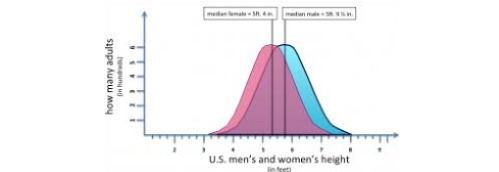
So, like I said, I grew up largely in rural, working-class Western Canadian society. My relatives tend to be tradesmen like carpenters, welders, or plumbers, or else ranchers and farmers. I was raised by a mother who came of age during the big push for Women’s Lib. So in the culture in which I was raised, it was very normal and in some ways rewarded (though in other ways punished) for women to have short hair, wear flannel and jeans, drive a big truck, play rough contact sports, use power tools, pitch in with farmwork, use guns, and drink beer. “Traditional femininity” was a fascinating foreign culture my grandmother aspired to, and I loved nonsense like polishing the silver (it’s a very satisfying pastime) but that was just another one of my weird hobbies, like sewing fairy clothes out of flower petals and collecting toy horses.
Within the standards of the society I was raised in, I am a decently feminine woman. I’m obviously not a “girly girl”, someone who wears makeup and dresses in ways that privilege beauty over practicality, but I have a long ponytail of hair and when I go to Mark’s Work Wearhouse, I shop in the women’s section. We know what “butch” is and I ain’t it.
But through my friendships and my career, I’ve gotten experiences among cultures you wouldn’t think would be too different–we’re all still white North Americans!–but which felt bizarre and alien, and ate away at the sense of self I’d grown up in. In the USA’s northeast, the people I met had the kind of access to communities with social clout, intellectual resources, and political power I hadn’t quite believed existed before I saw them. There really were people who knew politicians and potential employers socially before they ever had to apply to a job or ask for political assistance; there were people who really did propose projects to influential businessmen or academics at cocktail parties; they really did things like fundraise tens of thousands of dollars for a charity by asking fifty of their friends to donate, or start a business with a $2mil personal loan from a relative.
And in those societies, femininity was so different and so foreign. I’d grown up seeing femininity as a way of assigning tasks to get the work done; in these new circles, it was performative in a way that was entirely unique and astounding to me. A boss really would offer you a starting salary $10k higher than they might have if you wore high heels instead of flats. You really would be more likely to get a job if you wore makeup. And your ability to curate social connections in the halls of power really was influenced by how nice of a Christmas party you could throw. These women I met were being held, daily, to a standard of femininity higher than that performed by anyone in my 100 most immediate relatives.
So when girls from Seven Sisters schools talked about how for them, dressing how I dressed every day (jeans, boots, tee, button-up shirt, no makeup, no hair product) was “bucking gendered expectations” and “being unfeminine”, I began to feel totally unmoored. When I realized that I, who absolutely know only 5% as much about power tools and construction as my relatives in the trades, was more suited to take a hammer and wade in there than not just the “empowered” women but the self-professed “handy” men there, I didn’t know how to understand it. I felt like I was… a woman who knew how to do carpentry projects, not “totally butch” the way some people (approvingly) called me.
And, well, at home in Alberta I was generally seen as a sweet and gentle girl with an occasional stubborn streak or precocious moment, but apparently by the standards of Southern states like Georgia and Alabama I am like, 100x more blunt, assertive, and inconsiderate of men’s feelings than women typically feel they have to be.
And this is still all just US/Canadian white women.
And like I said, after years of this, I came home (from BC, where I encountered MORE OTHER weird and alien social constructs, though generally more around class and politics than gender) to Alberta, and I went to what is, for Alberta, a super hippy liberal church, and I helped prepare the after-service tea among women with unstyled hair and no makeup who wore jeans and sensible shoes, and listened to them talk about their work in municipal water management and ICU nursing, and it felt like something inside my chest slid back into place, because I understood myself as a woman again, and not some alien thing floating outside the expectations of the society I was in with a chestful of opinions no one around me would understand, suddenly all made sense again.
I mean, that’s by no means an endorsement for aspirational middle class rural Alberta as the ideal gender utopia. (Alberta is the Texas of Canada.) I just felt comfortable inside because it’s the culture where I found a definition of myself and my gender I could live with, because its boundaries of what’s considered “female” were broad enough to hold all the parts of me I felt like I needed to express. I have a lot of friends who grew up here, or in families like mine, and don’t feel at all happy with its gender boundaries. And even as I’m comfortable being a woman here, I still want to push and transform it, to make it even more feminist and politically left and decolonized.
TERFs try to claim that trans and nonbinary people reinforce the gender identity, but in my experience, it’s feminists who claim male and female are immutable and incompatible do that. It’s trans, nonbinary, and genderqueer people who, simply by performing their genders in public, make people realize just how bullshit innate theories of gender are.. Society is going to want to gender them in certain ways and involve them in certain dynamics (”Hey ladies, those fellas, amirite?”) and they’re going, “Nope. Not me. Cut it out.” I’ve seen a lot of cis people who will quietly admit they do think men and women are different because that’s just reality, watch someone they know transition, and suddenly go, “Oh my god, I get it now.”
Like yes, this is me being coldly political and thinking about people as examples to make a political point. Everyone’s valid and can do what they want, but some things are just easier for potential converts to wrap their minds around.. “I’m sorting through toys to give to Shelly’s baby. He probably won’t want a princess crown, huh?” “I actually know several people who were considered boys when they were babies and never got one, and are making up for all their lost princess crown time now as adults. You never know what he’ll be into when he grows up.” “…Okay, point. I’ll throw it in there.” Trans and enby people disrupt gender in a really powerful back-of-the-brain way where people suddenly see how much leeway there is between gender and sex.
I honestly believe supporting trans and enby people and queering gender until it’s a macrame project instead of a spectrum are how we’ll get to a gender-free utopia. I think cultural feminism is just the same old shit, inverted. (Confession: in my head, I pronounce “cultural” with emphasis on the “cult” part.)
I think feminism is like a lot of emergency response groups: Our job is to put ourselves out of a job. It’s not a good thing if gender discrimination is still prevalent and harmful 200 years from now! Obviously we’re not there yet and calls to pack it in and go home are overrated, but as the problem disappears into its solution, we have to accept that our old ways of looking at the world have to shift.
918 notes
·
View notes
Text
Padme Amidala part one; why did the madonna/whore complex give this woman sharpshooting skills?
This is going to be part one of a two part post about the star wars prequel films (sorry in advance about that), specifically Padme and her role as the only important female character in the 90s triliogy. This post will talk about the first two films, and the next post will talk about the third and final film. Keep in mind that I did not see the prequel films until I was an adult (which is kind of weird, since the prequels have a lot more kid oriented jokes (from C3PO getting assembled wrong on the assembly line in film two and making a series of bad puns to everything about jar jar binks (which, as a side note, YIKES we dont stan racist comedy here, but the "humor" with him was clearly directed at kids)). That being said I think the three films over all are a hilarious product of the 90s and I'm not trying to start discourse about wether they're objectively good or bad-- they are both, and that's okay. What I'm interested in is Padme. The "Madonna"/"Whore" dicotemy is a freudian idea. I don't neccisarily believe that it happens with all men in real life, and I certainly don't think we should excuse it in real life, but I DO think it is previlant in writing, and the way female characters are written (both presently and in the past). The madonna/whore dicotemy basically boils down to the idea that men view women either as "good" virtuous people (the madonna, a maternal figure and an eternal virgin) whom they love but could never sexualize, OR as sexually interesting companions (the whore), whome they desire but could never love. This of course, in the real world is a bullshit excuse for putting women into patriarical boxes based on their outwards apperance and if any man ever gives you "well now I genuinely care about you so I feel like I can't sexualize you" it's time to go because that sexualization inherently included violence if he's now worried about thinking like that around you. There is plenty of feminist literature written about this concept and I highly reccomend a look into it because it's fascinating (try starting with even just the abstract for this paper: https://psycnet.apa.org/record/2018-04940-001). However! What I'm here to talk about today is how writers unconciously use this dicotemy with their female characters, and why, specifically, when Padme gets graduated from Madonna to Whore in Attack of the Clones, she suddenly knows how to fight when she couldn't before. My aim is not to conclusively say why, because I've been analyzing these films for the past couple days and I still have no idea why, but rather just to bring the question up, and provide evidence, as it is a fascinating phenonmeon of the 90s that I feel many female characters got treated to (with Padme as a prime example). Lets talk about Phantom Menace and Attack of the Clones and the Madonna/ Whore. In Phantom Menace we're introduced to Padme (Natalie Portman) as an intellegent diplomat. When she's not done up in her planet's traditional leader's dress, she's in long sleeved simple dresses, tights and braids. She wears natural make up in her "maid disguise" for which she is in ninty percent of the film, and in the famously creepy "tucking in anakin" scene she is for some reason in the whole royal maid getup which includes gloves and covering her hair. Cultural modesty for the royal maids was written in to the worldbuilding, but it seems to have been done larely so that they could get away with having Natalie Portman play young Padme in this film and not be "sexy" until film two in which she is teenage Padme. Padme plays an extremely maternal role for Anakin in Phantom Menace, from physically protecting him to the aformentioned tuck in scene at 1:19:30 where she quite literally tucks him in for bed. This of course has been analyzed all to hell already as exceedingly WEIRD because the two eventually marry and have children together (so the freud analysis here is valid). We'll take a quick break for a digression here on Padme's age. I've refered to her in Phantom Menace as "young Padme", but realistically she is just Portman minus the makeup she's allowed to wear in later films. We know that she's the "child-ruler" of her nation, but she also realistically feels like she's in her early teens in Phantom Menace, and is certainly treated like an adult by her peers; we see her throughout the film making decisions on foriegn policy, wartime politics and wartime sacrifices. Anakin was most definietly a child in the first film, and was replaced by an adult actor in the subsequent films as his character aged, and this difference makes it feel like there's a very large and very weird age gap between the two characters. But fully back to the matter at hand, Padme is a very maternal, modest character in Phantom Menace both in apperance and in dialouge, and she clearly establishes that she views Anakin as a child. In Attack of the Clones, when the romance plotline starts, suddenly Padme is allowed to be sexy (by 90s standards anyways). She gets jewlery, she gets makeup, and she gets a whole lot more ARMS and shoulders showing that she was previously allowed (specifically see 44:30 when they travel back to Naboo). Of course this is to coincide with her growing up, but the fact of the matter is that Padme gets to be attractive when the script calls for Anakin to be attracted to her. There are still some traditional queenly outfits, but by the time they're ready to go rescue Obi Wan, she's in a skin tight white jumpsuit (which eventually, at 1:47:06, becomes a crop top when a monster somehow slices her back and makes her entire shirt cut in half). For the next 15 minutes we then see Natalie portman running around in a white crop top while fighting). We get such lines from Anakin as "I am in agony... if you are suffering as much as I am, please, tell me" and "we could keep it a secret" at 55:10 in a darkly lit room with Padme's weird black leather dress and gloves combo. (Yes, I know Padme tells Anakin she doesn't want a relationship with him in this scene, but the scene's whole function is to establish why society says they shouldn't be together, but why Anakin is attracted to her anyways, and for this Padme is presented to the viewer as an inherently sexual object which Anakin can't have which A) gross but B) fits into the whore achetype of characterization). In both physical presentation and characterization Padme flips to the other end of the dicotemy and Attack of the Clones now gives us Whore Padme. The other huge character change that happens at the same time for Padme is her ability to fight. In Phantom Menace she's primarily a diplomat; she has a few moments of sprinting around and brandishing a weapon, but she almost never uses it. In Attack of the Clones we get a direct quote from her at 1:36:00 that she's "not interested in getting into a war" and that she'll find a "diplomatic solution out of this mess". However she then proceeds to pick the lock to her shackles, pick up a gun she's never used before, and fight off not just monsters, but also hold her own with the literal jedi against the enroaching droids. The movie leads up to this scene in terms of their relationship, and when Padme admits to Anakin that she loves him too she is somehow also graced with the ability to fight. Again, I'm not really sure why; my best guess is that the other female love interests of the 90s were extremely capable women (ie. good at things like fighting and even fighting in crop tops), and that the capable women who was still romantically submissive was so dominant of an archtype it just bled into her charactization without any writer stopping to consider that she's never cannonically been trained to fight like the jedi characters and therefor should be way out of her depth in this battle. I'm all for female character who are physically strong and capable (obviously), but having her develop fighting skills as a side effect of wearing sexier outfits is very weird writing. Padme of course goes back to falling off things and needing saving during the climax of the film and indeed she'll do it again in film three, but for this moment of romantic tension finally resolved and Padme fulling moving from motherly figure to sexy love interest, she can suddenly fight. Food for thought and I'd love to hear any suggestions as to why you think it might be.
1 note
·
View note